Latest update: 29th June 2009
Another duck nest this year, much earlier than
last year, with 11 eggs, eight of which hatched on 11th April 2009. This page
has photos
of the ducklings from four weeks old in early May, until they
finally left on 12th June 2009. Mum started a second nest but disappeared after
laying seven more eggs, almost certainly a victim of one of the foxes.
Ducks - 2009 Nest has photos of the nest and pond up until they eggs hatched.
Ducklings - 2009 has photos of the eggs hatching in April 2009 and the first four weeks of the ducklings development.
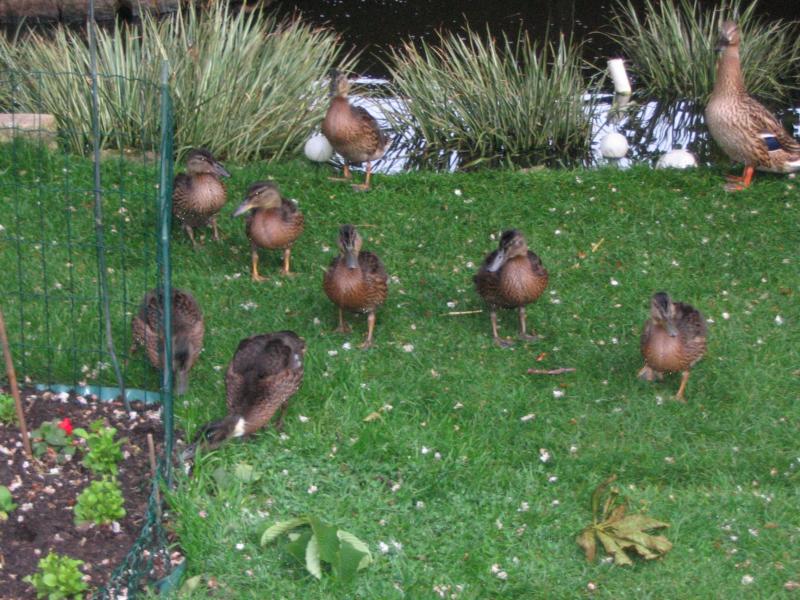
9th
May, eight young ducks are four weeks old today and have lost most of their
fluffy feathers, so their colouring (both male and female) now
resembles mum.
One young duck has an unusual white collar.
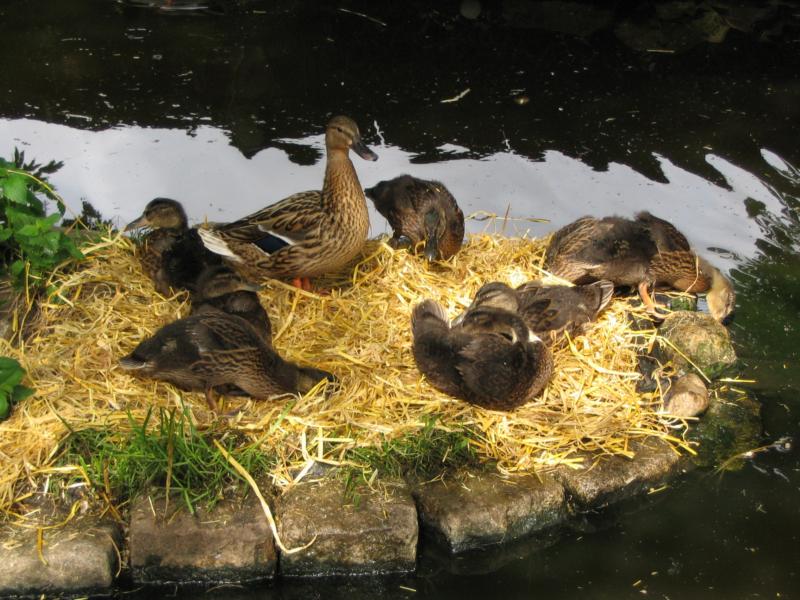
Just changed the straw on the island, which leads to games moving it around, so unfortunately some ends up in the water.
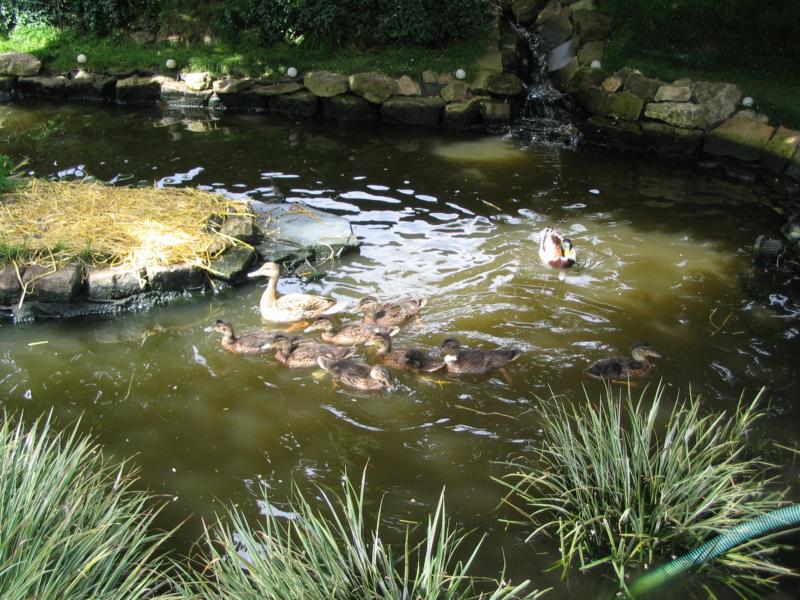
The
pond filters have trouble dealing with duck's waste, the water is far too brown,
but at least does not smell like last year, and no
fish have died yet.
It's six weeks earlier than last year so the water is cooler and the fish are
not yet stressed. Nevertheless, I'm
doing a pre-emptive partial water
change to get rid of some of the bad water. The one inch hose in the
foreground is emptying about
1,000 gallons onto the garden, dropping the
pond level several inches so the edging rock selves are exposed. It takes about
one hour
to drop the level using the old fountain pump, and five hours to
refill with the garden hose.
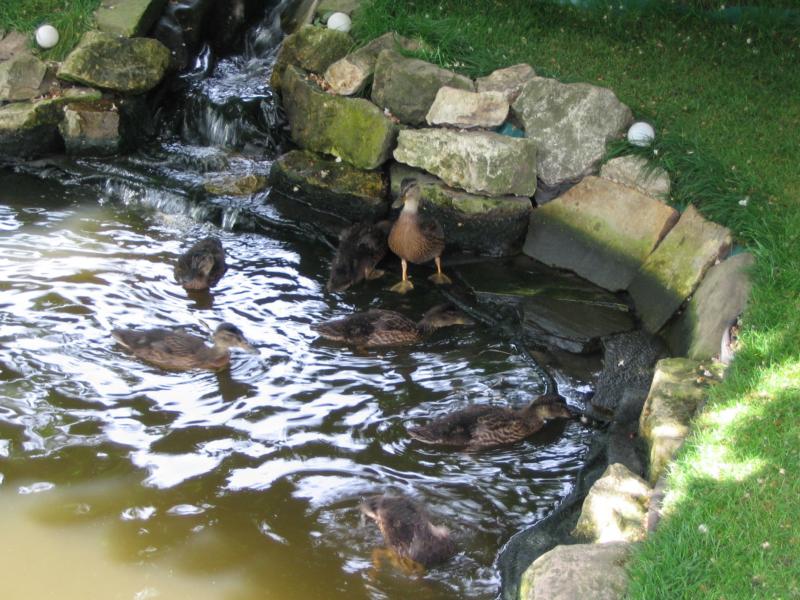
The young ducks see the dropped water level as an adventure, since it reveals surfaces with food.
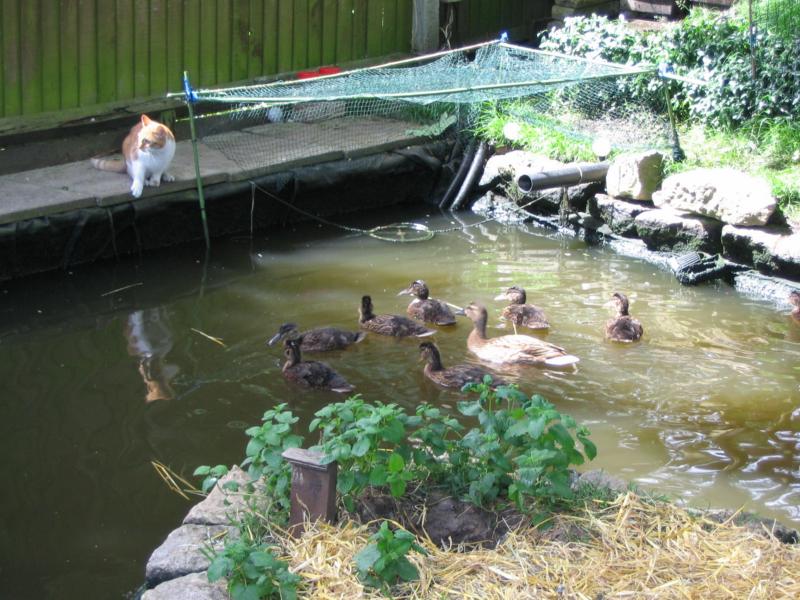
A neighbour's cat comes to watch.
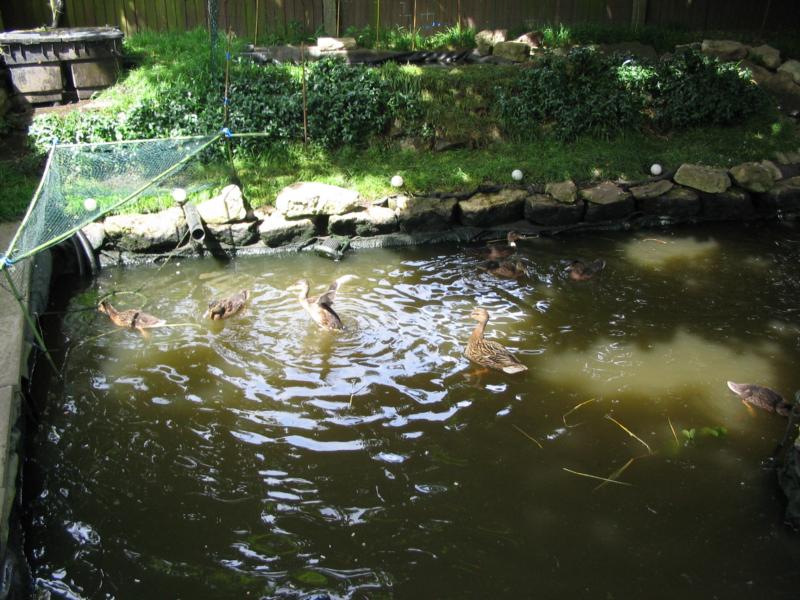
Games continue, one young duck can be see stretching his (or her) wings.
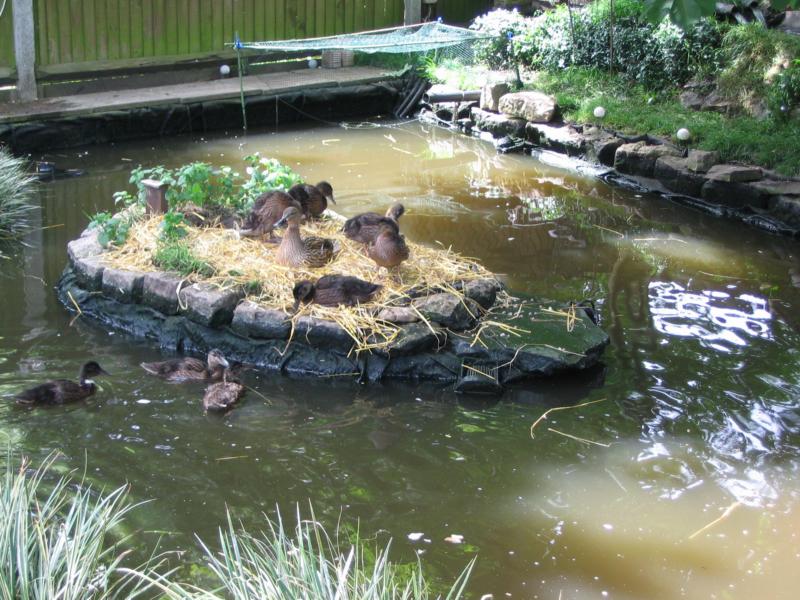
Despite the lower water level, they are still able to climb out of the pond onto the bank and island.
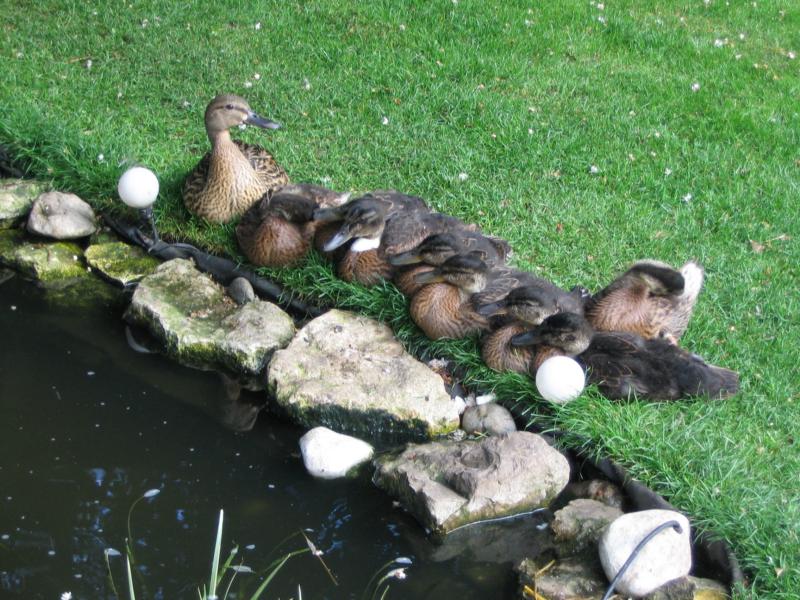
10th May, sleeping in a row, which is fine until one moves, when it's like dominoes.
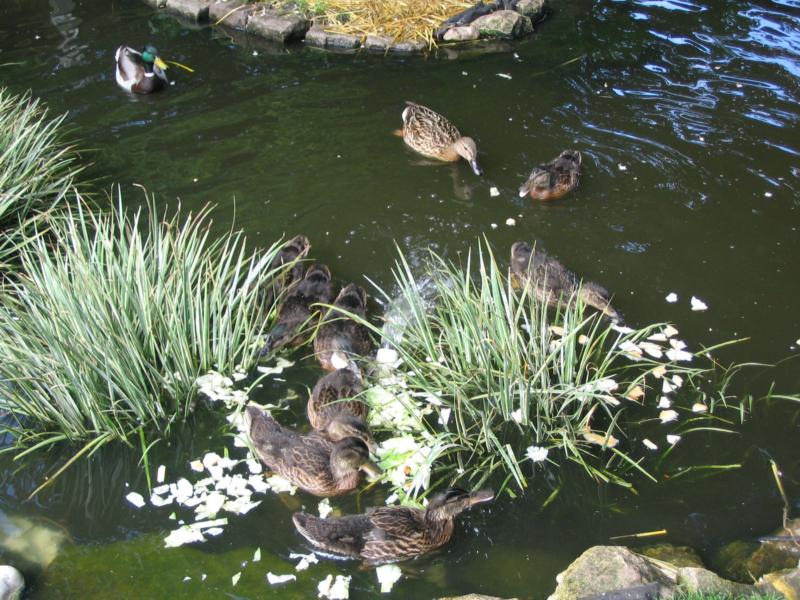
Feeding time, bread and cut up lettuce. For some reason, the adults are not interested in lettuce.
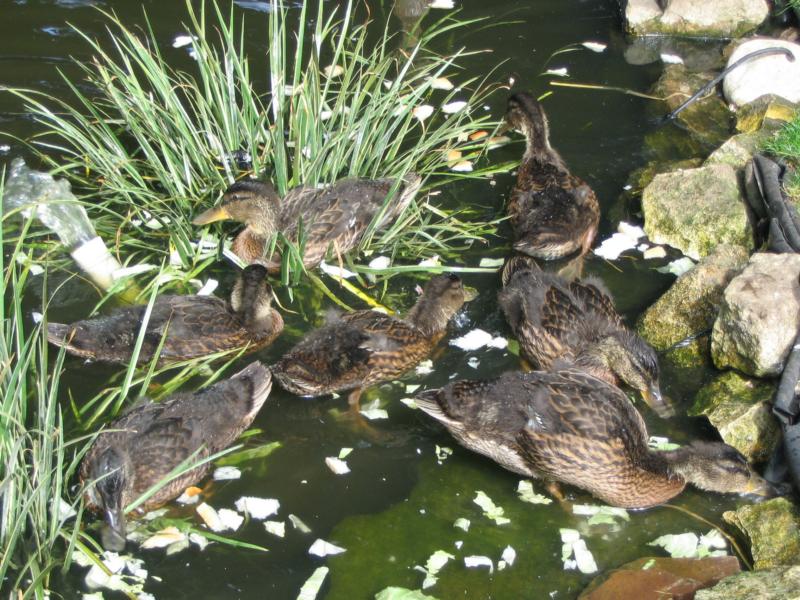
Lettuce is very popular, I tried cabbage but that was less interesting. Both are cheaper than them eating my pond and garden plants.
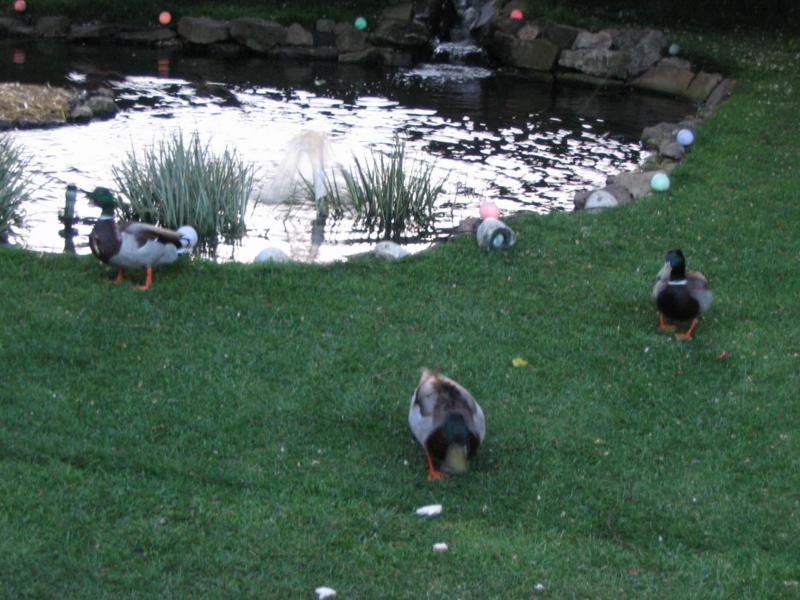
Three or four boys come back twice or more often a day, looking for food.
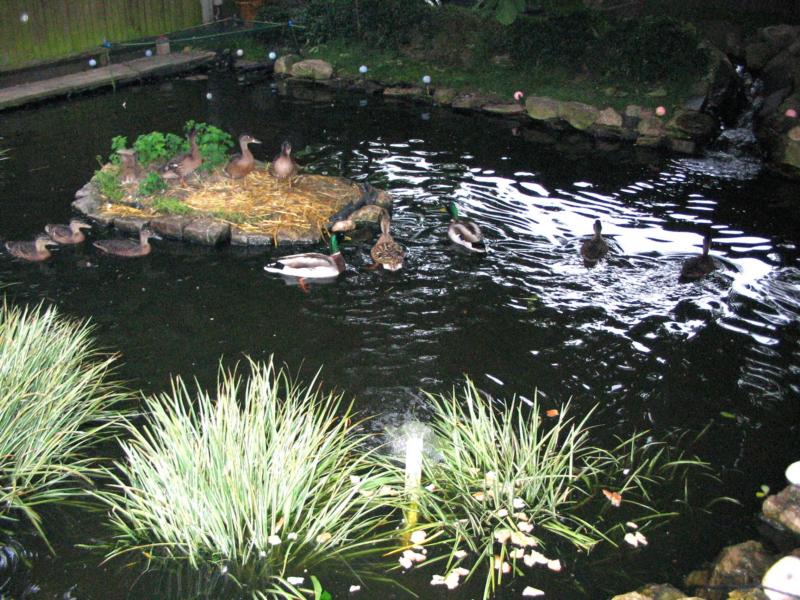
And can cause chaos chasing each other around the pound, so the young ducks have to get out of the way.
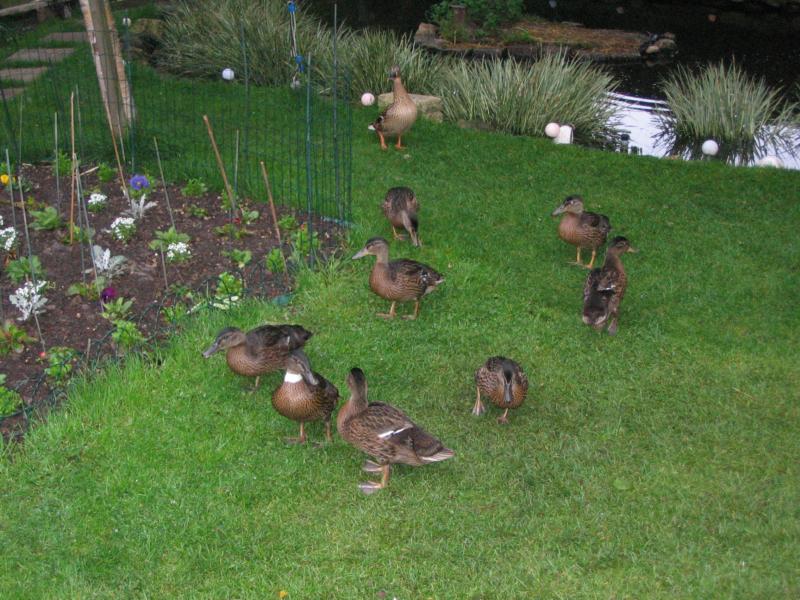
14th May, the eight young ducks waiting to be fed early in the morning, with
mother at the back, they are fast approaching her size, but
their colouring
is darker so still easy to distinguish, particularly the 'vicar' with a white
collar.
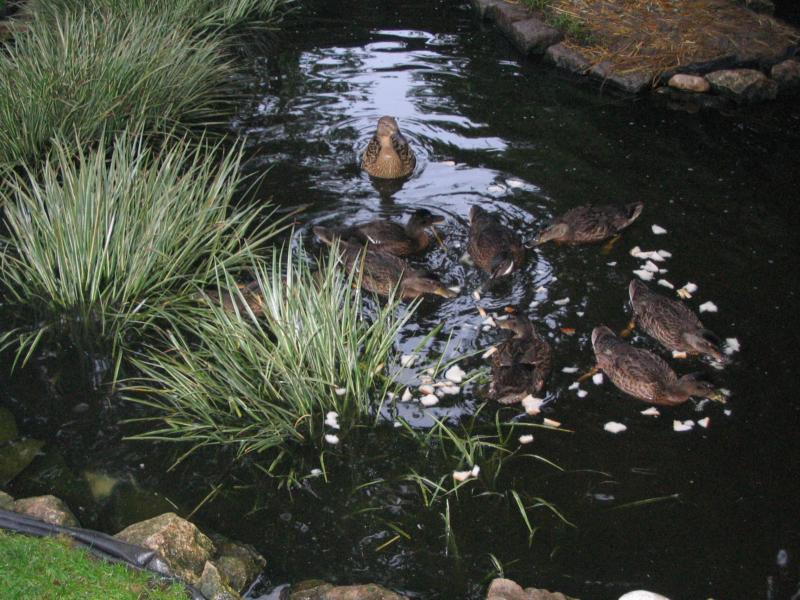
Eating their bread.
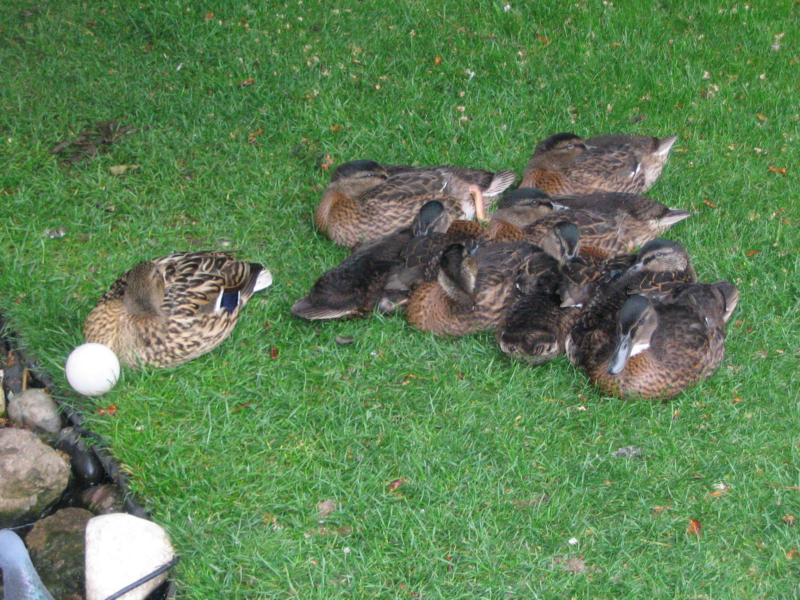
And sleeping the meal off.
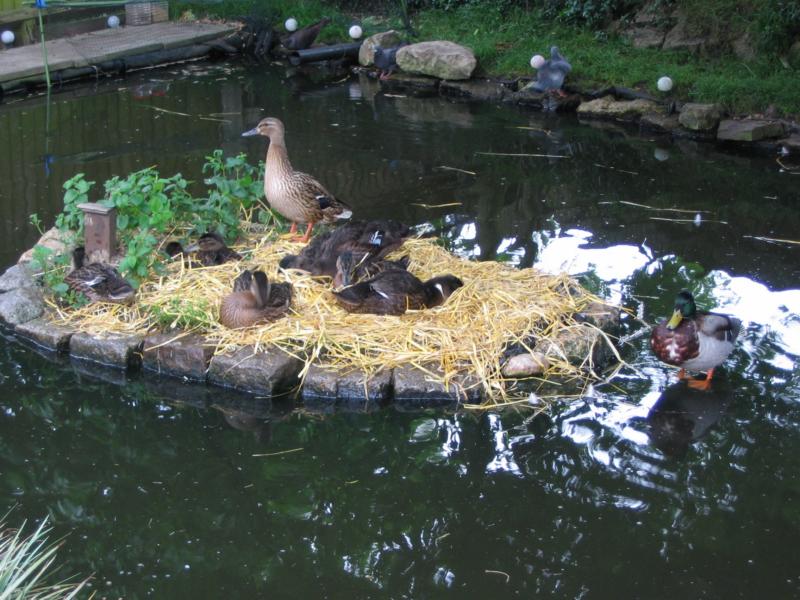
Fresh straw on the island, only two young ducks will now fit in the nest hole. Mother's mate stands guard.
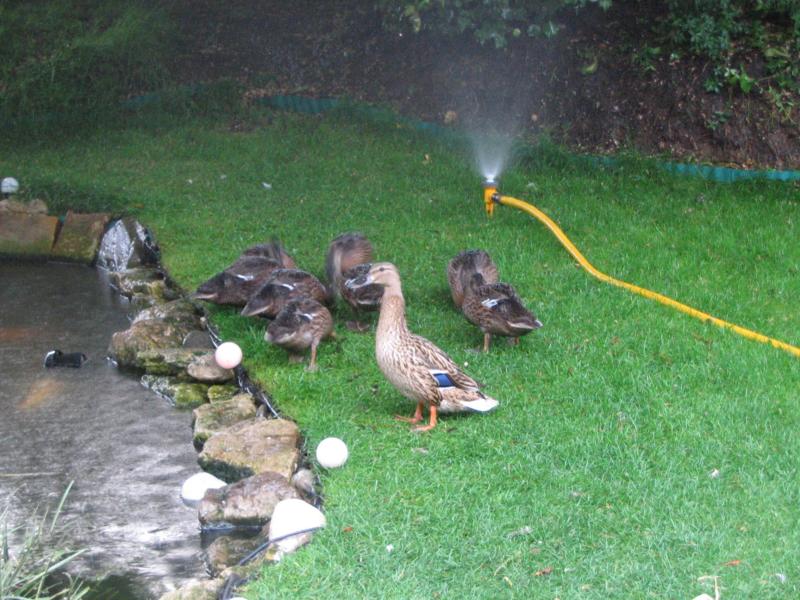
The sprinkler always attracts attention, because damp grass means worms come to the surface.
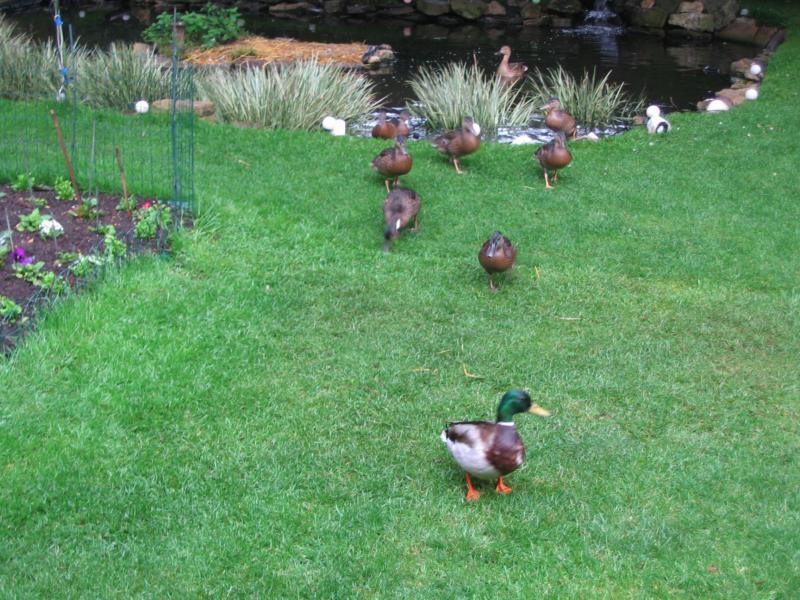
Another early morning, the male seems the hungriest.
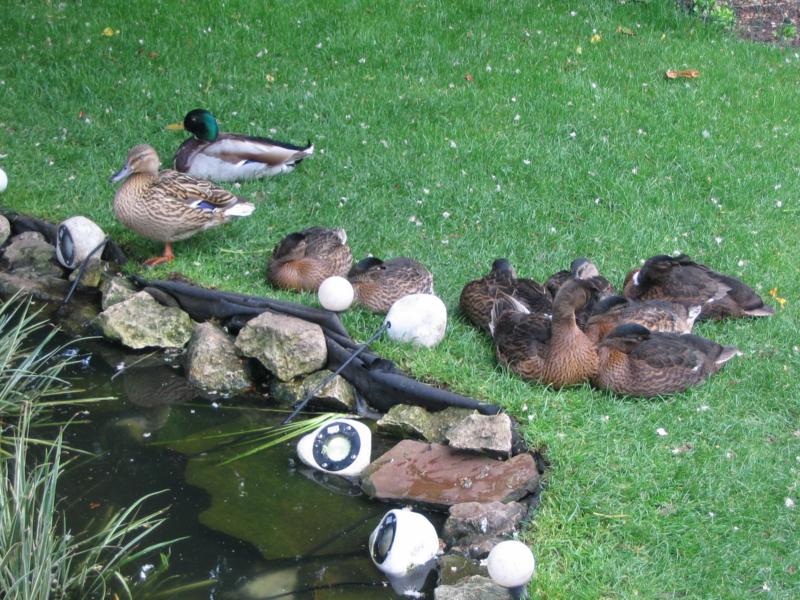
Sunbathing, which was rare during a damp week.
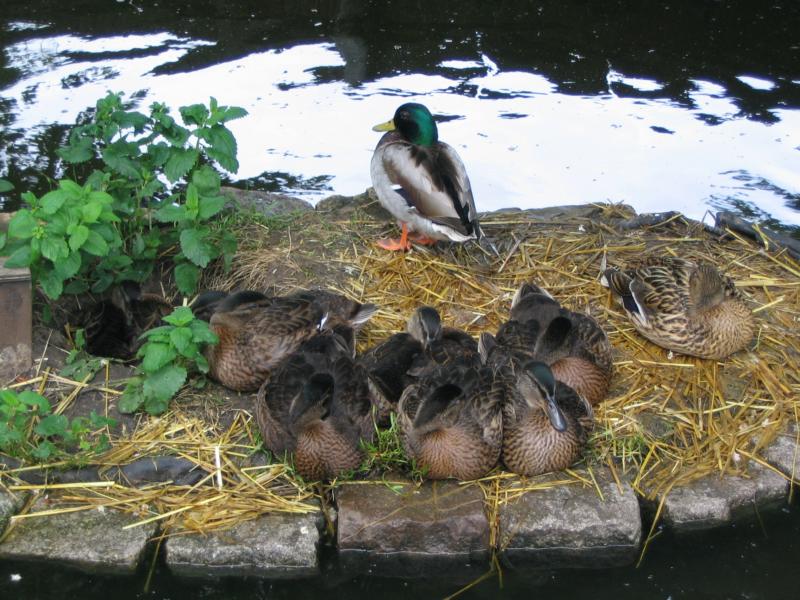
16th May and five weeks old today, lined up on the island.
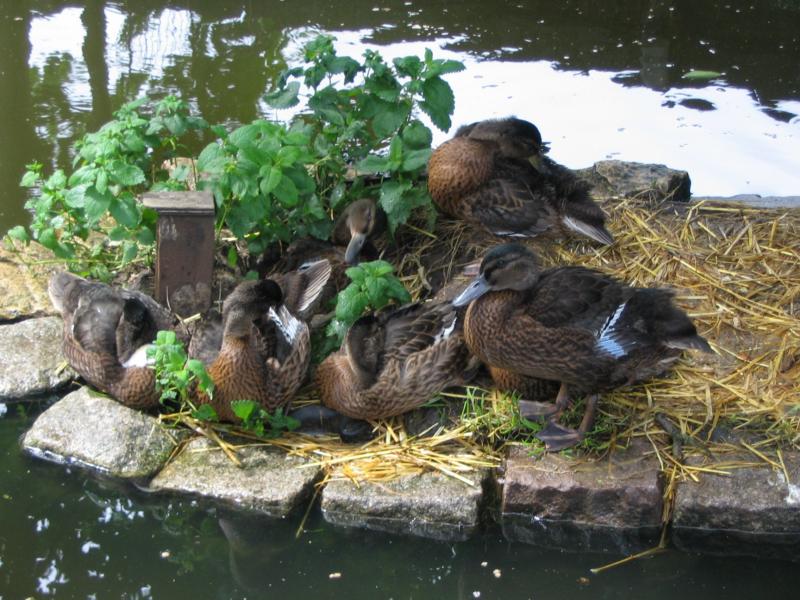
The young ducks wings are still growing, at least another week before flying lessons start, but the blue feathers are appearing.
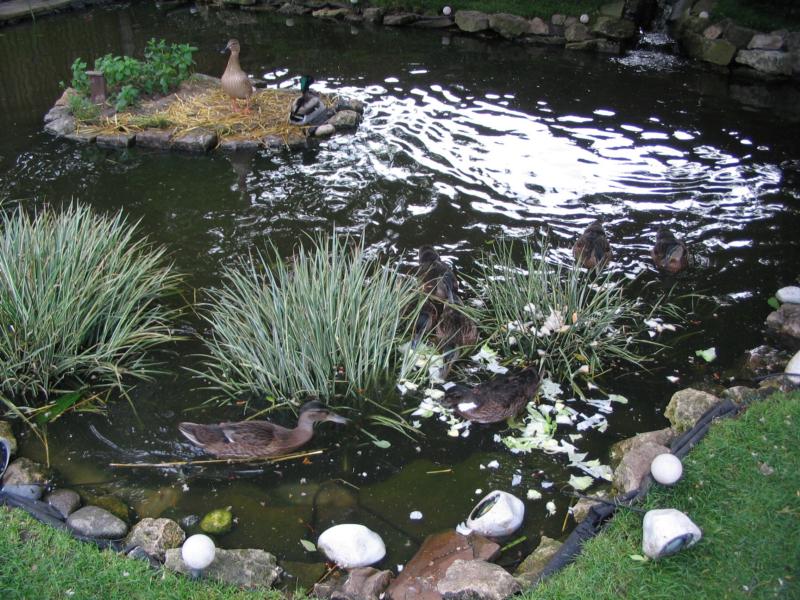
The young ducks don't wait for mother before eating their lettuce and bread.
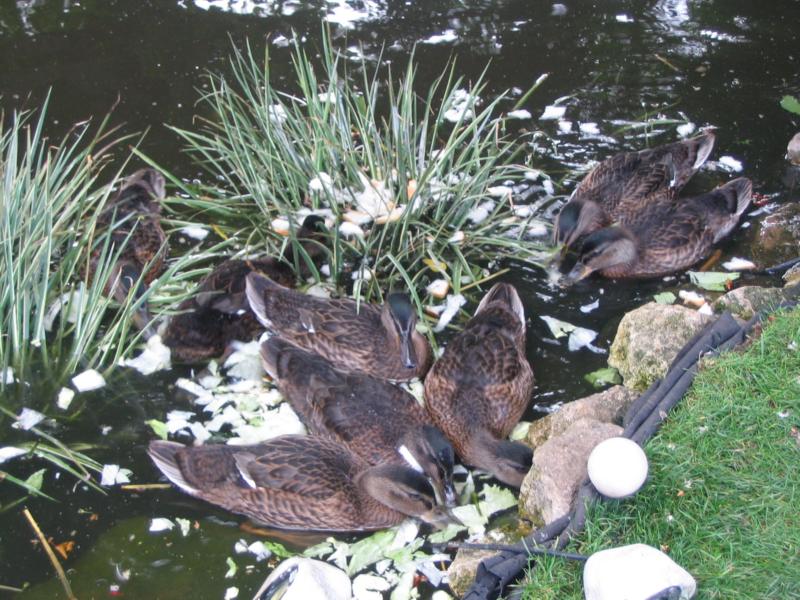
As well as lettuce, they have been eating cauliflower leaves.
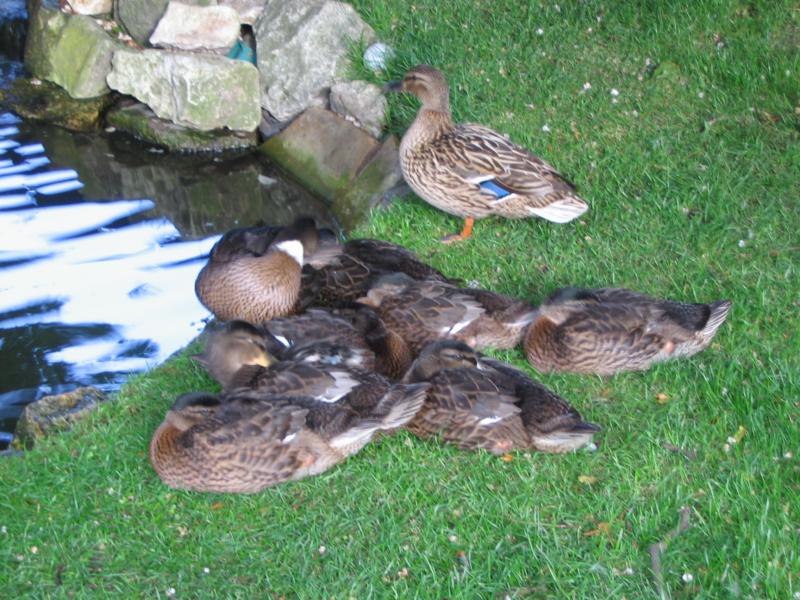
This corner gets sun in the morning.
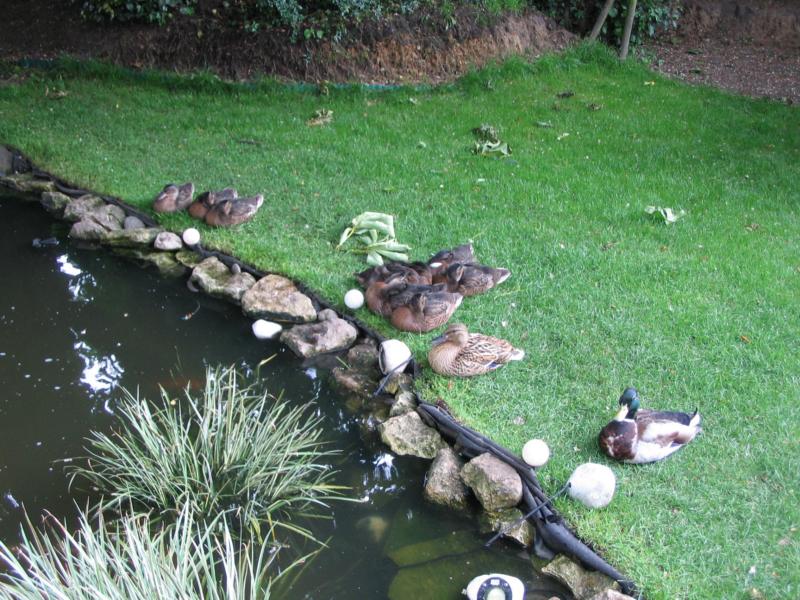
Then they move around the pond as the sun moves.
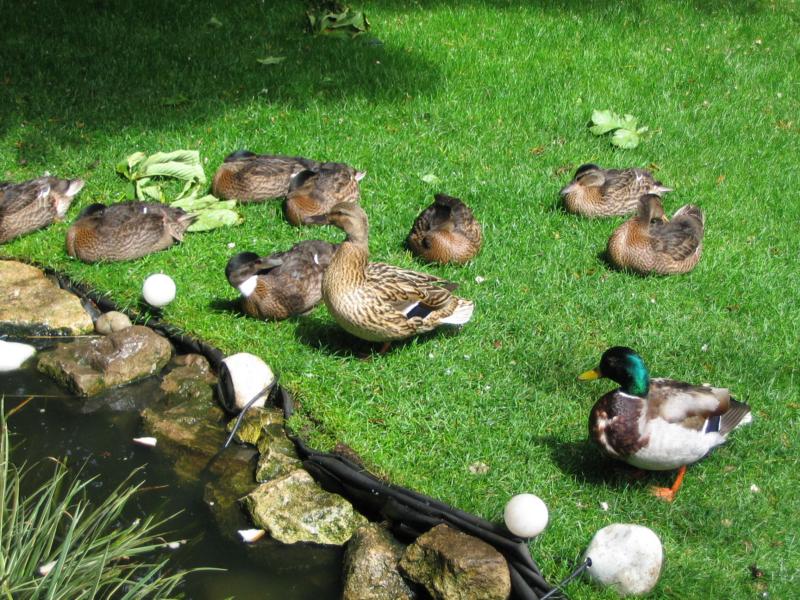
And further around to keep away from the shadows.
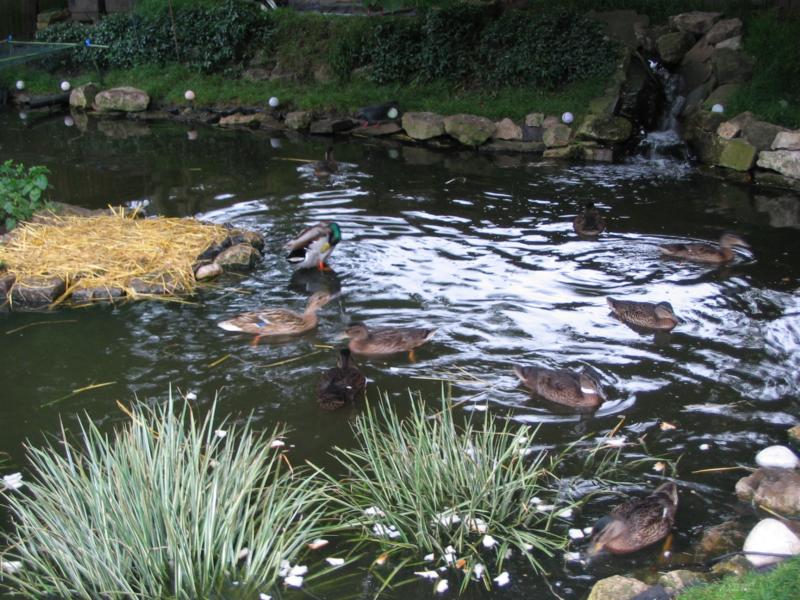
Early evening feeding time.
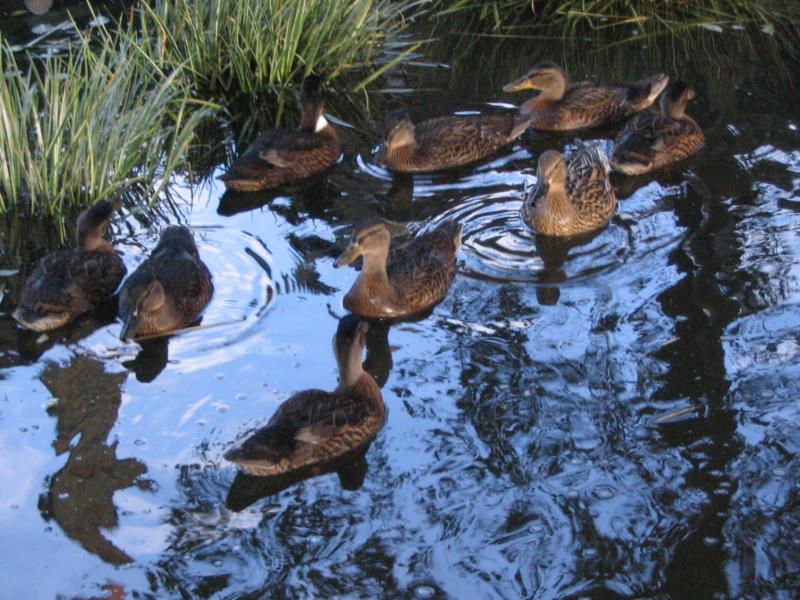
18th May, most synchronised swimming around the island.
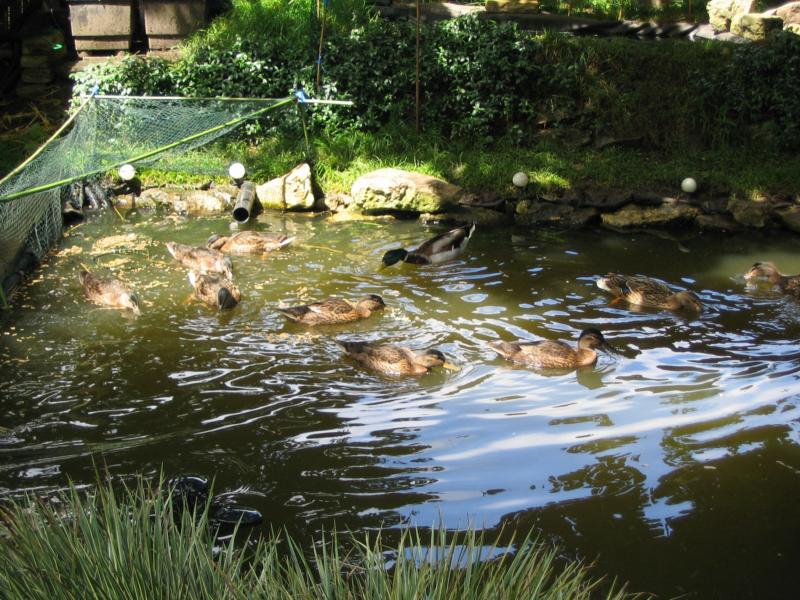
Eating the duck and fish pellets.
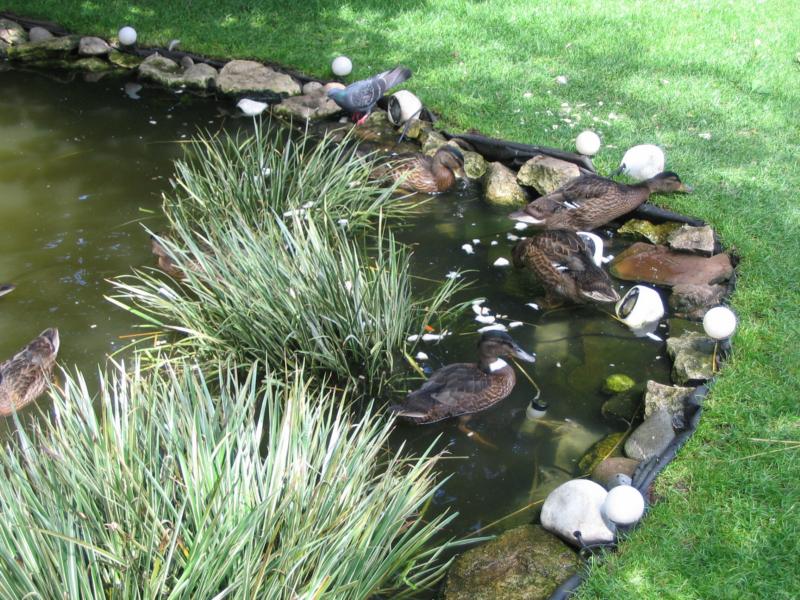
Back in the shallow corner, eating bread.
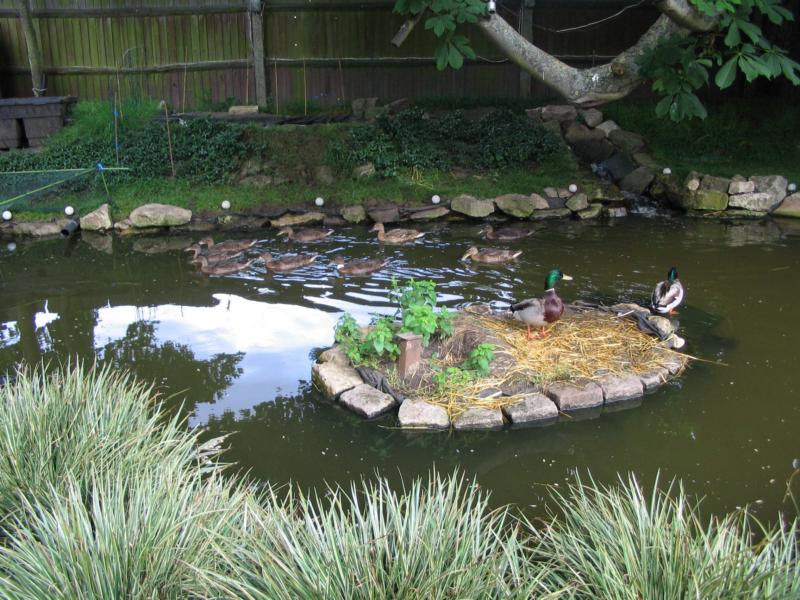
20th May, the arrival of a second male makes mum and the young ducks restless.
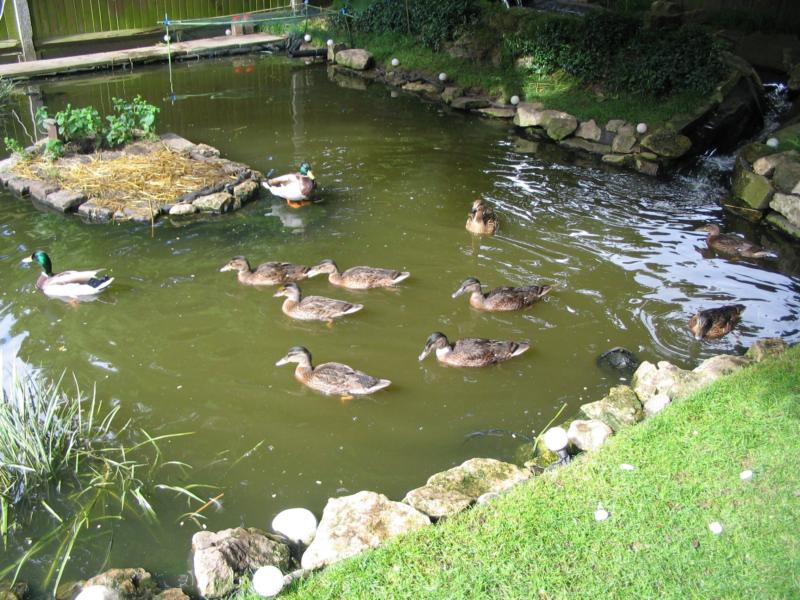
Until the young ducks chase the second male out of the pond. He arrives
each evening looking for food, once given bread he usually
flies off.
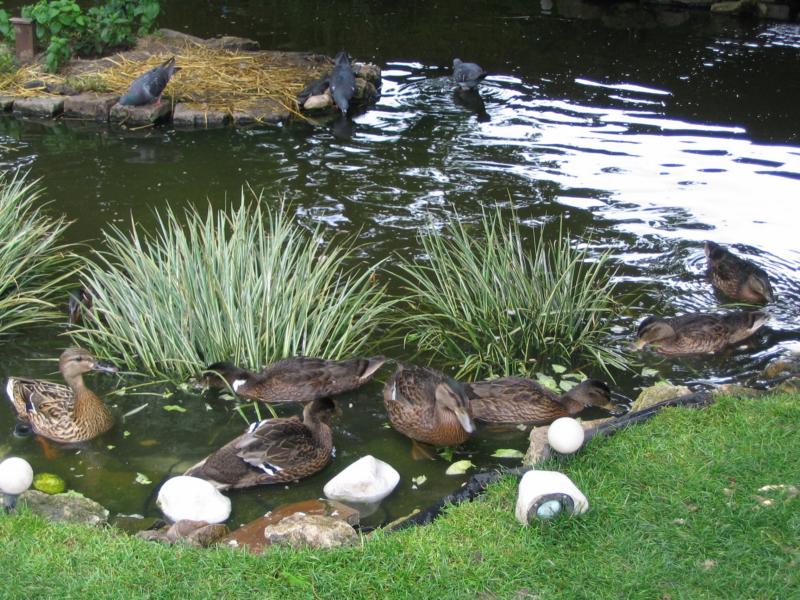
The young ducks eating their lettuce. Strangely, I've not seen mum eat any lettuce.
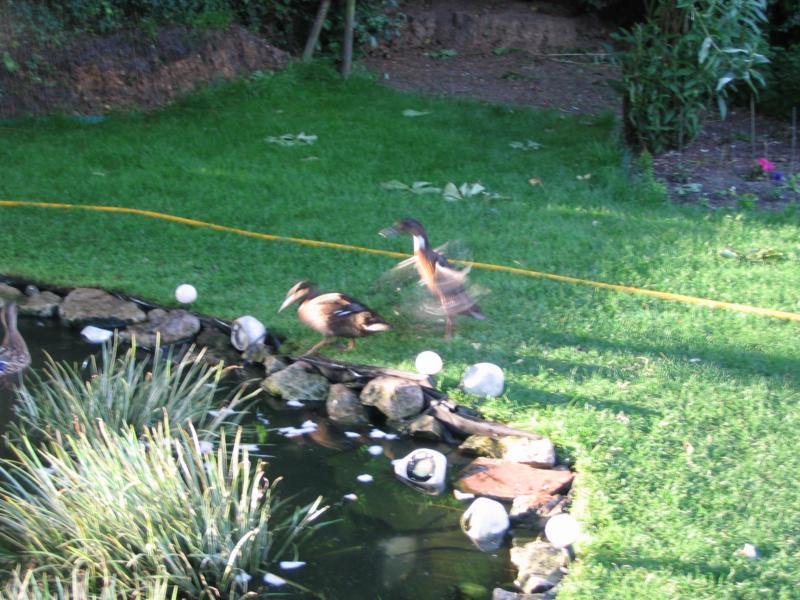
Wing flapping exercise, they are getting larger, but not sufficient for flight, that's another two weeks.
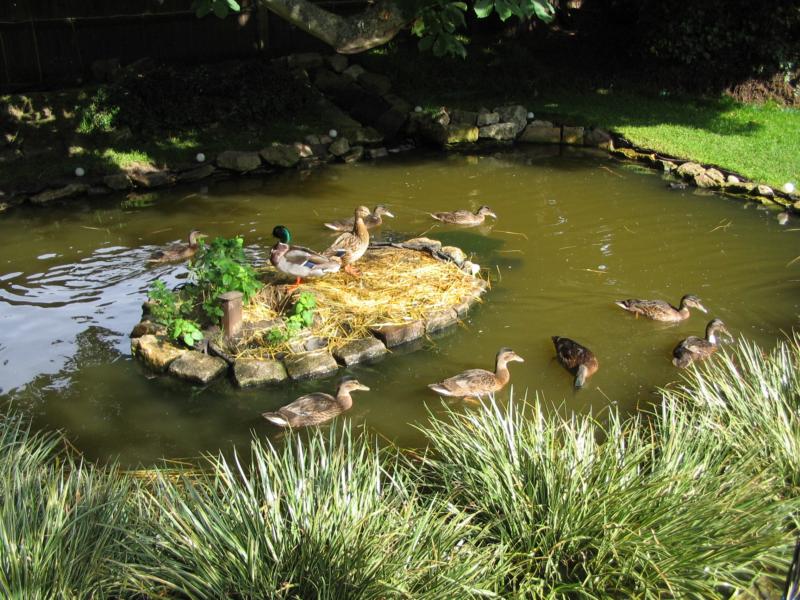
21st May, the young ducks are not yet six weeks old, but are now adult size.
Only a darker colouring distinguishes them from mother,
although four are
probably boys.
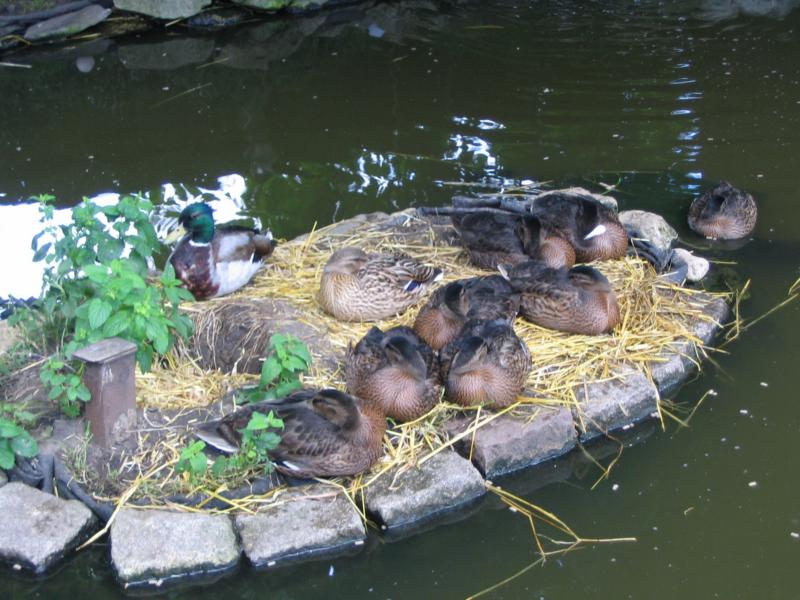
Their size means find space to sleep on the island is getting harder. Sometimes there are two adult males as well.
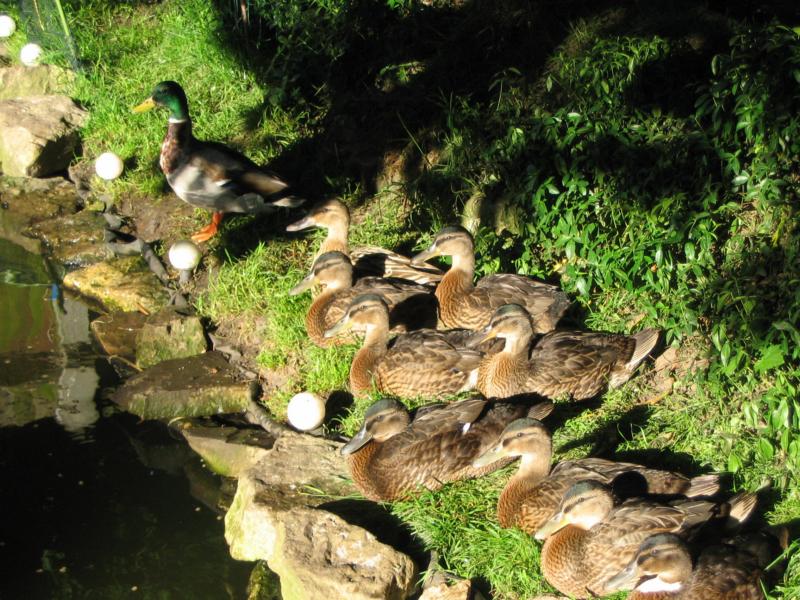
22nd May, settled down after early morning feed in the sun, mum is at that back.
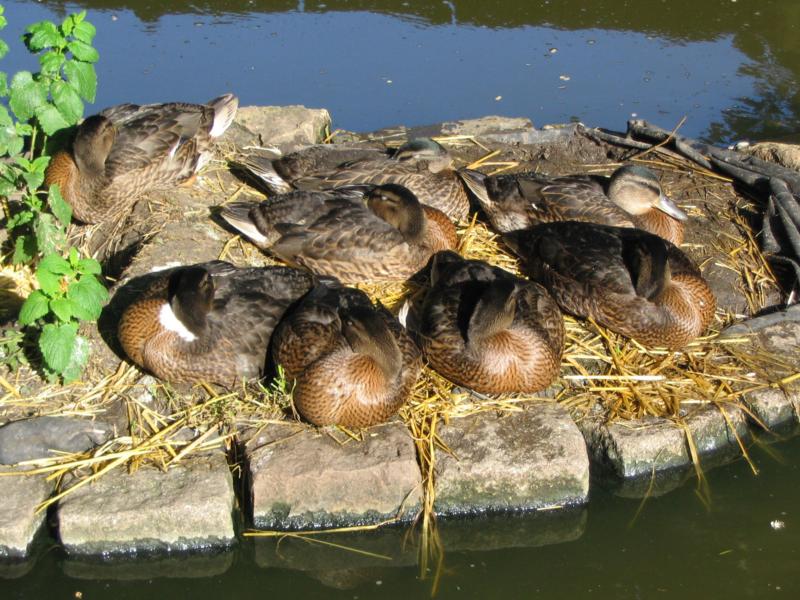
23rd May, six weeks old today, mum has flown off with her mate for an hour, leaving them alone on the island.
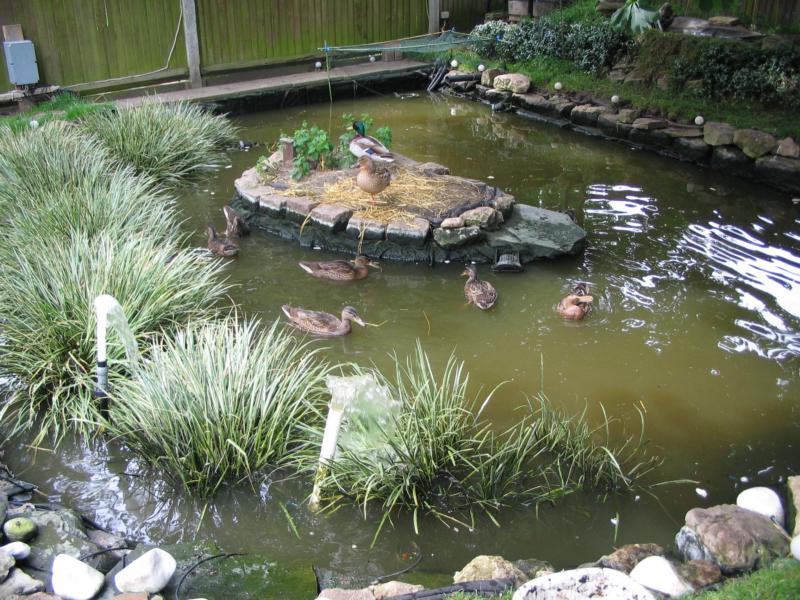
I've emptied about 1,000 gallons of water onto the garden, so it can be replaced
with fresh water. Both the fountain pumps are now
running since the
water temperature is raising in the warmer weather, and because one of the two
main filtration pumps blew a fuse two
night running and stopped, it's less
than one year old. With only one pump running, the fish started gasping for air,
another reason for
water change this week.
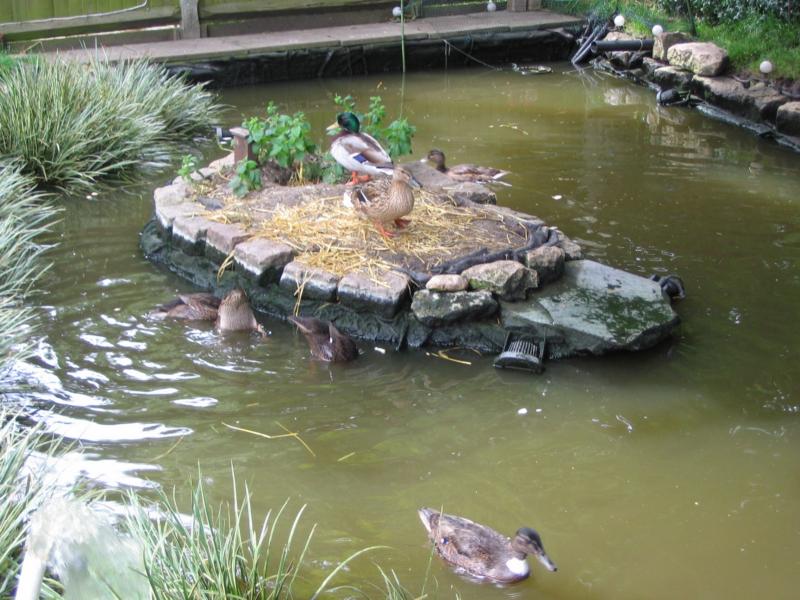
The lower water level gives the young ducks access to planting shelves and other possible sources of food.
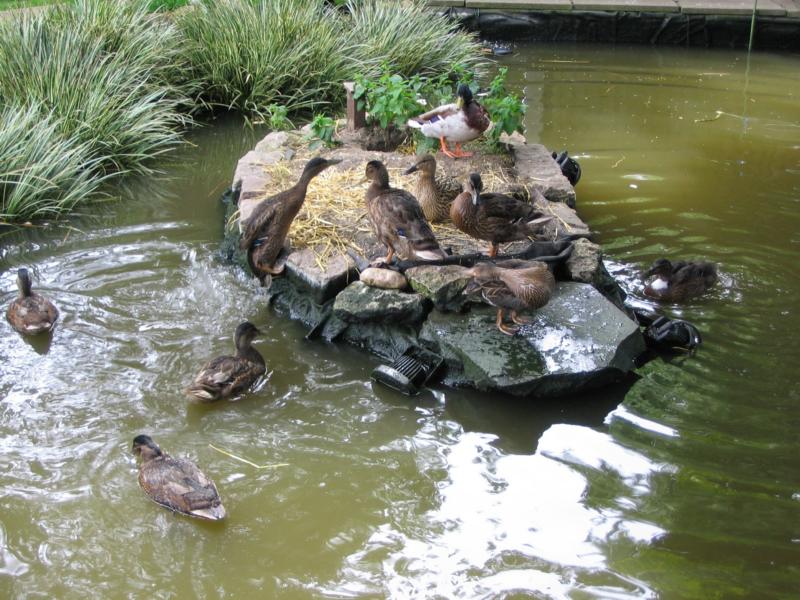
Climbing back onto the island.
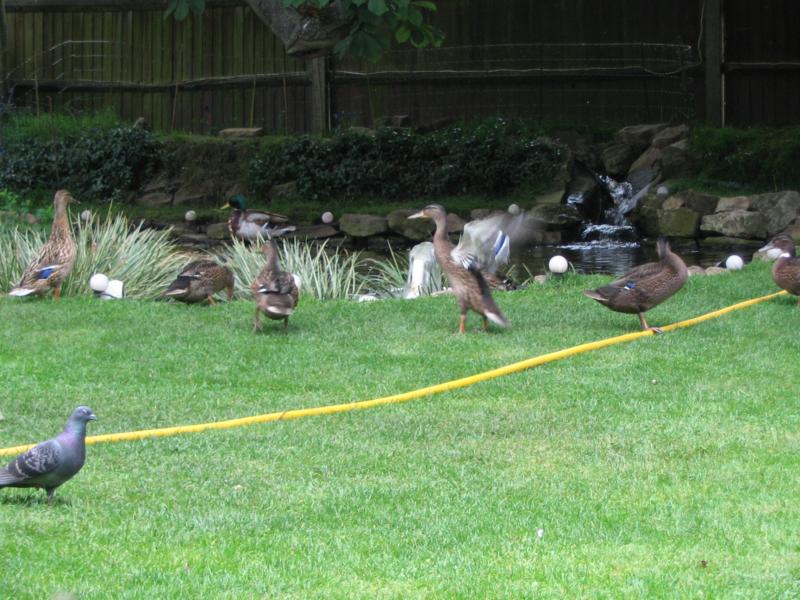
More wing exercise, the young ducks run down the lawn waving their wings, but
can not take off yet. They also swim at high speed
along the pond, with
mum taking off from the water to try and get them to do the same.
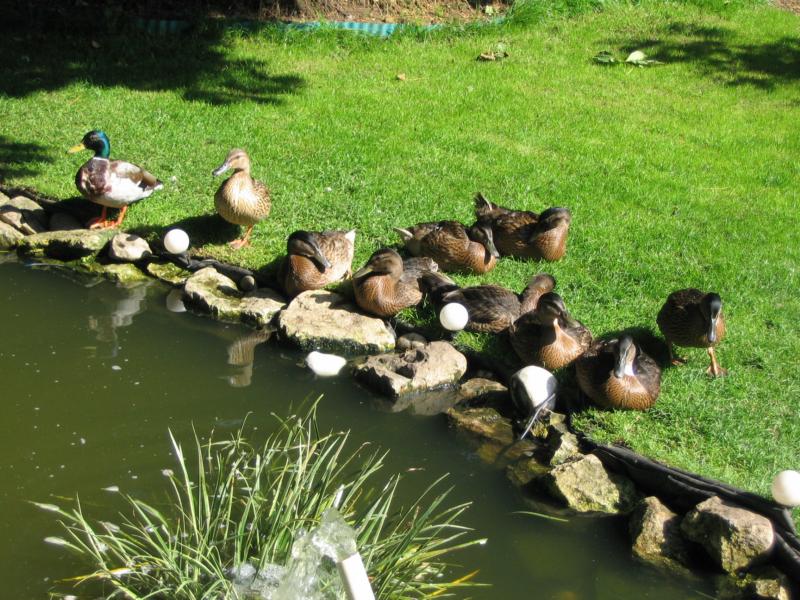
24th May, early morning sun, sometimes they sleep alone...
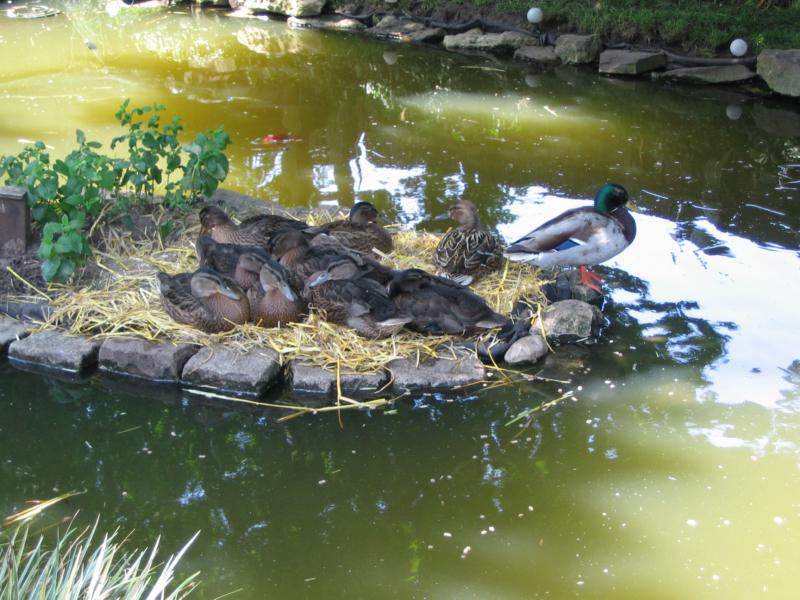
but they can still sleep bunched up together.
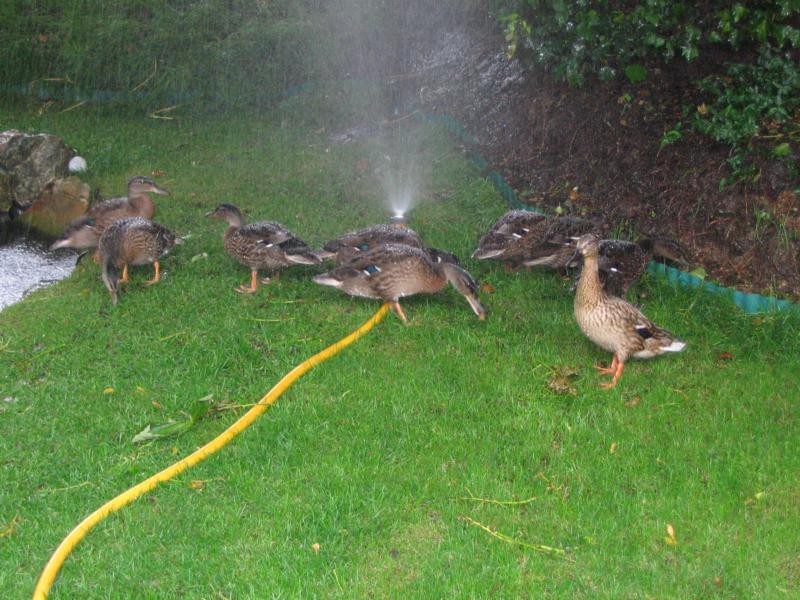
25th May, the sprinkler is always an attraction, the young ducks drink the water, and also poke the dampened earth looking for worms.
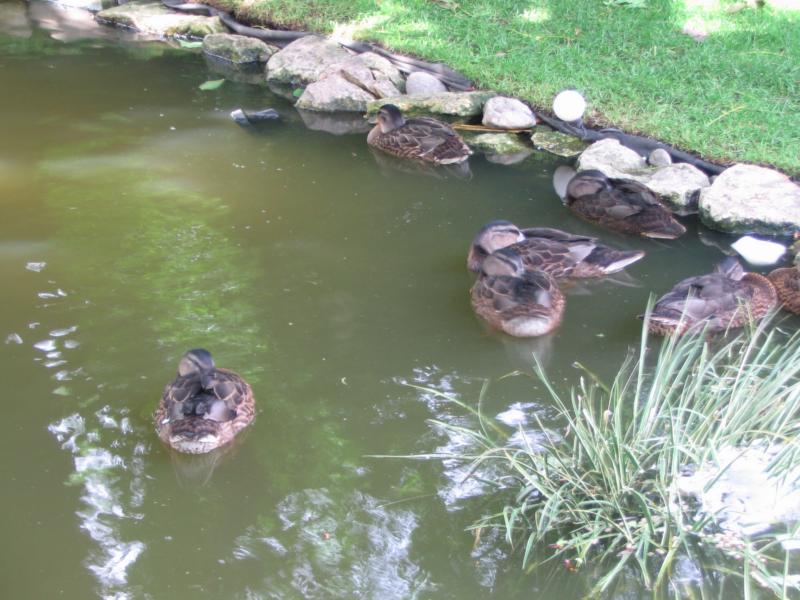
Back in the pond, the young ducks sleep on the water, heads on their backs,
being blown around by the wind and bumping into each
other like billiard
balls. All ducks sleep during the day, rather than the night, since it's
harder for predators to sneak up on them.
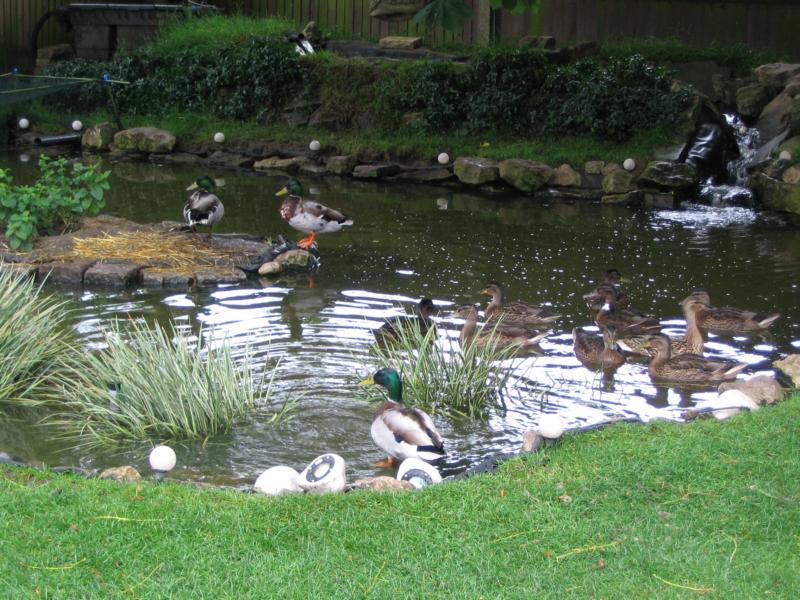
27th May at lunch time there are 12 ducks in the pond, eight young ducks, mum and dad and two more males looking for food.
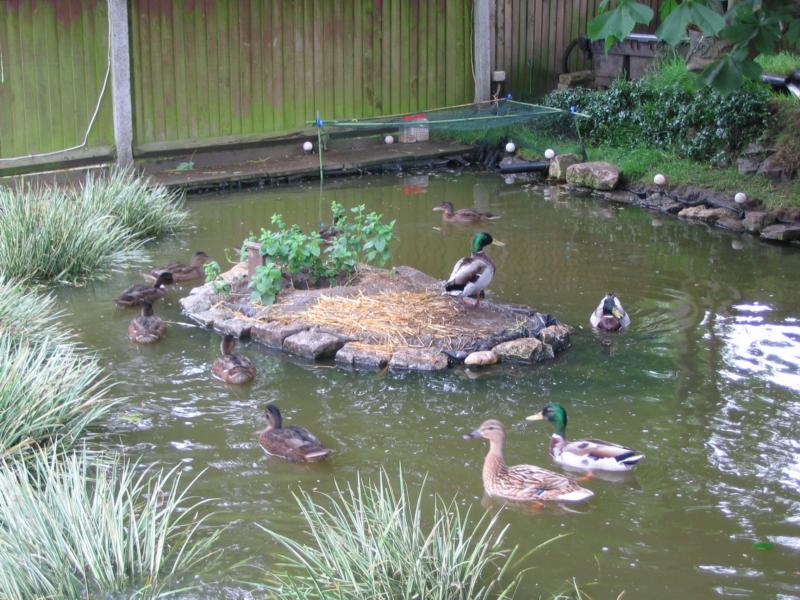
Chasing each other around the island.
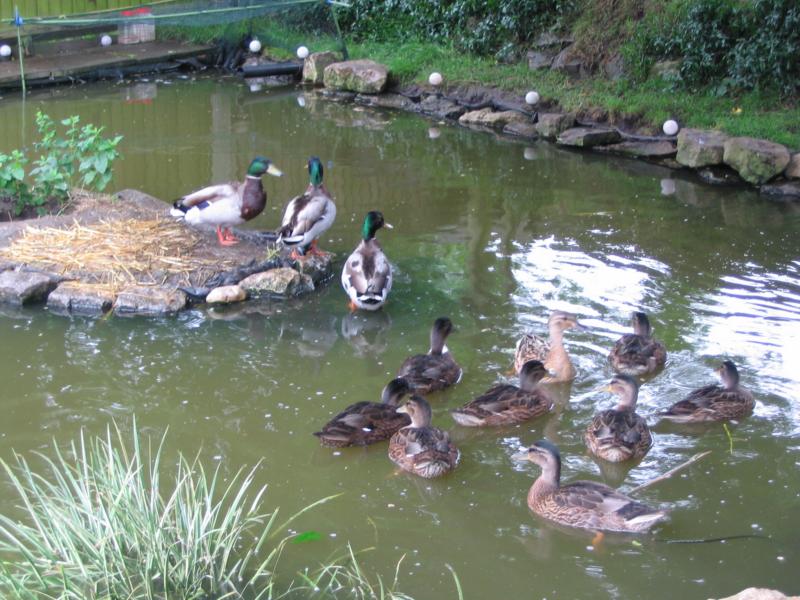
The
three boys get on reasonably well together now the breeding season is over,
although a fourth returns occasionally who still tries to
mate with mum
causing he to leave the pond.
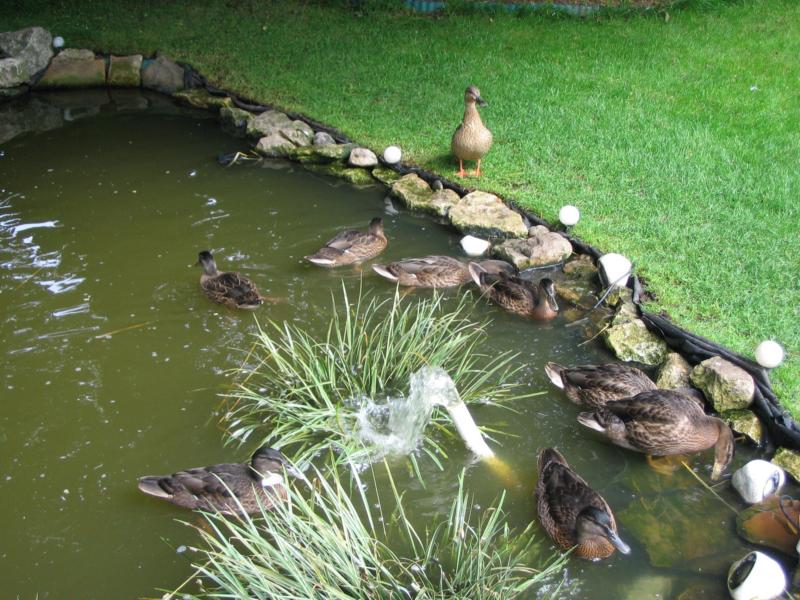
Looking for food.
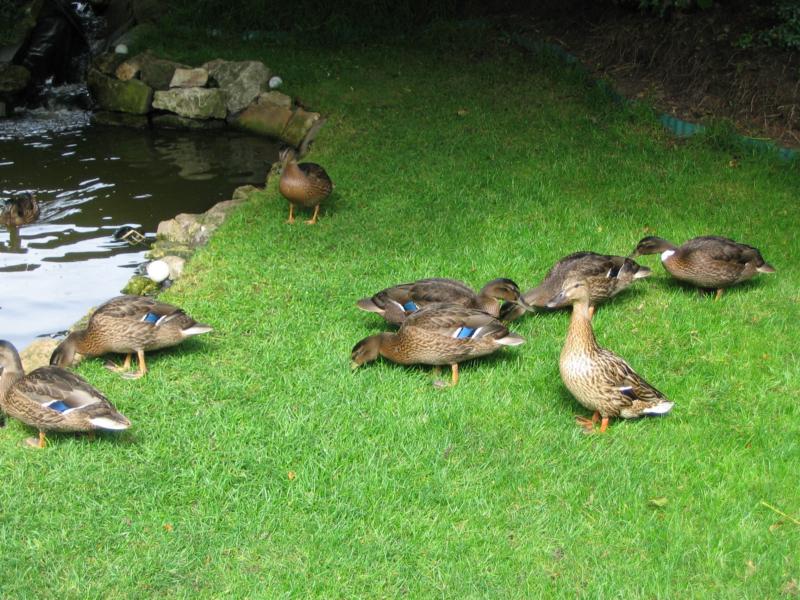
Exploring the lawn, looking for worms.
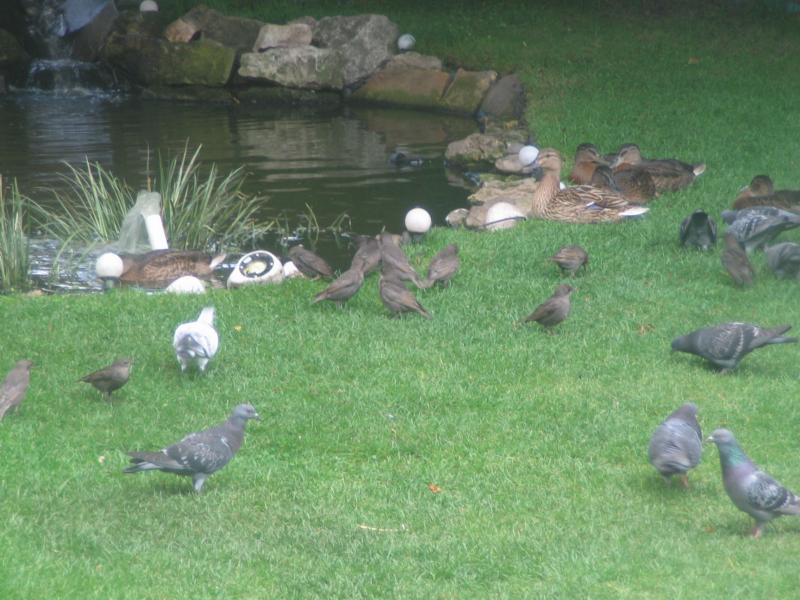
28th May, starling fledglings have left their nests and arrived very noisily in
the garden, following their mothers around looking for food,
and often
waiting near the pond to be fed. On a bad day, they eat up to three loaves of
bread, and the ducks a further loaf.
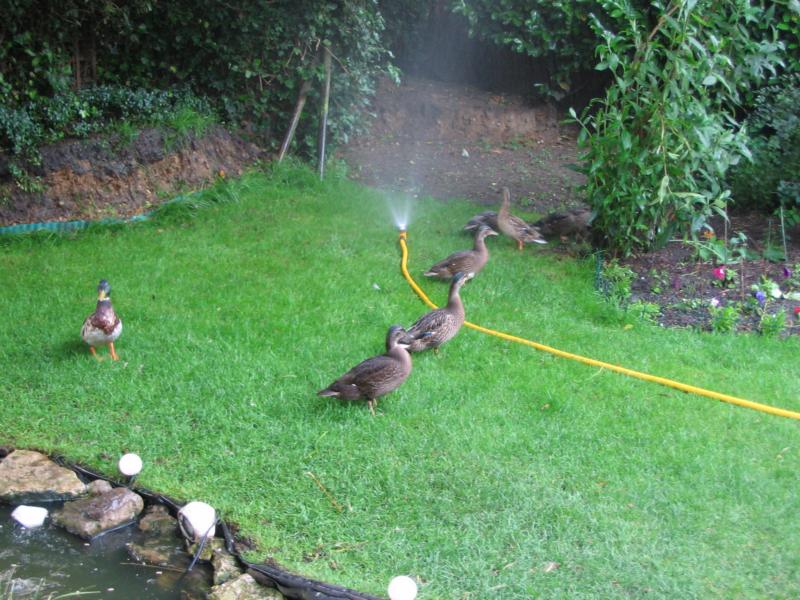
Trying to keep the new lawn alive under the tree, and keep the young ducks entertained.
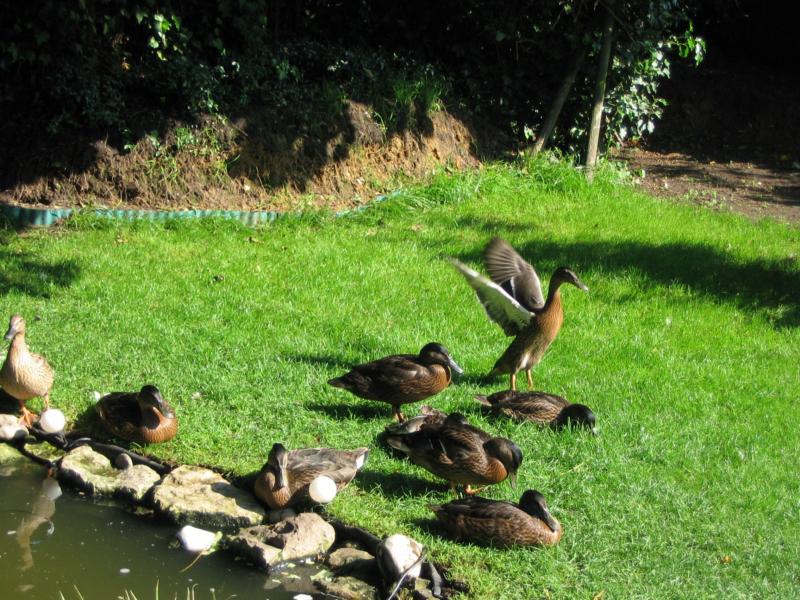
The
young ducks are fully grown, except for the wings, which they regularly exercise
stationary, or running around the lawn. During the
next week they
should start leaping from the banks behind the pond, and the first will fly away
in about one week.
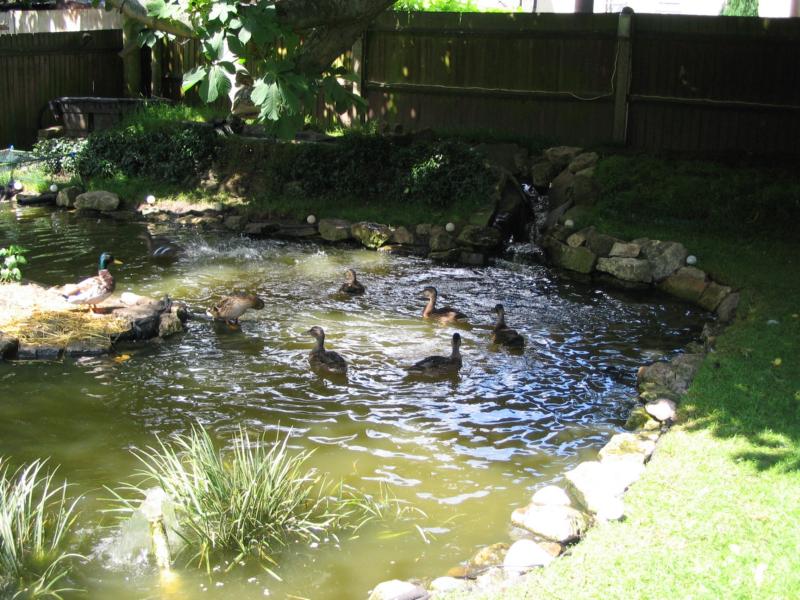
Flying lessons also take place in the pond, with high speed chases around and
across the pond, with lots of wing flapping and splashing,
it usually only
last about two minutes and is hard to photograph unless I'm in the garden with
the camera at that moment.
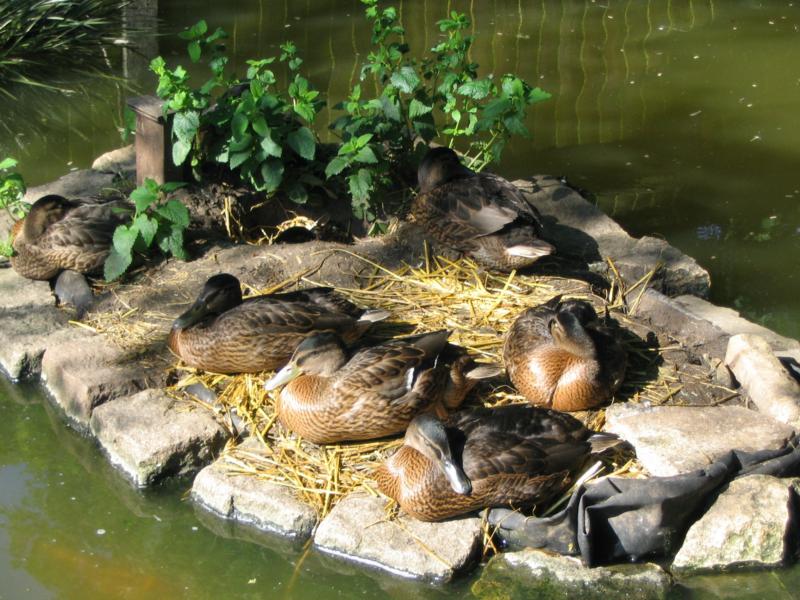
30th May, seven weeks old today. The eight young ducks sleeping on the
island, mum and dad are flying away for increasingly long
periods each day.
If it's the same as last year, mum will finally leave the pond in a few days
time. But things could be different this year
since it's six weeks
earlier than last year.
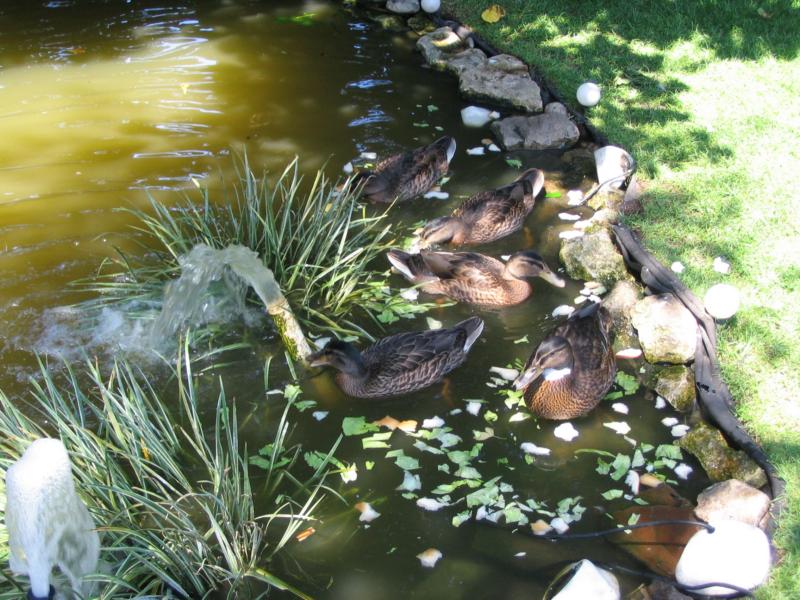
Breakfast of bread and lettuce.
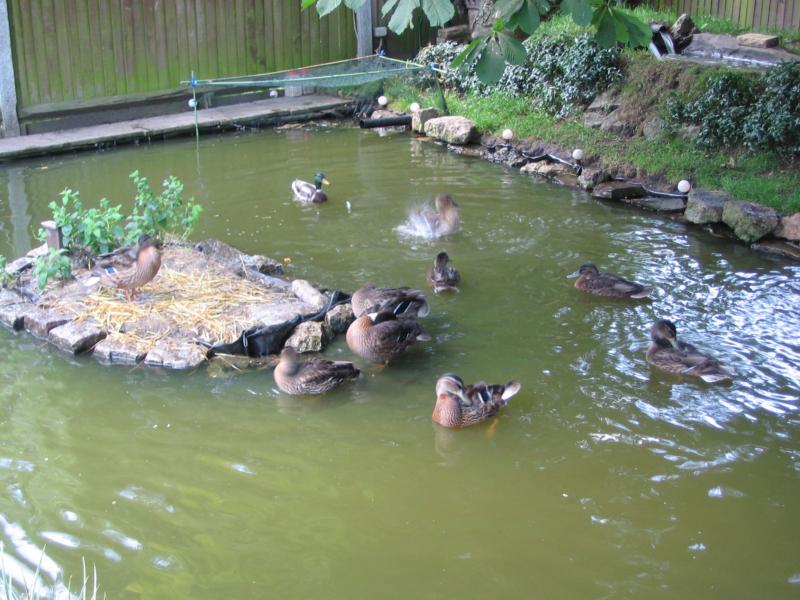
More flying lessons.
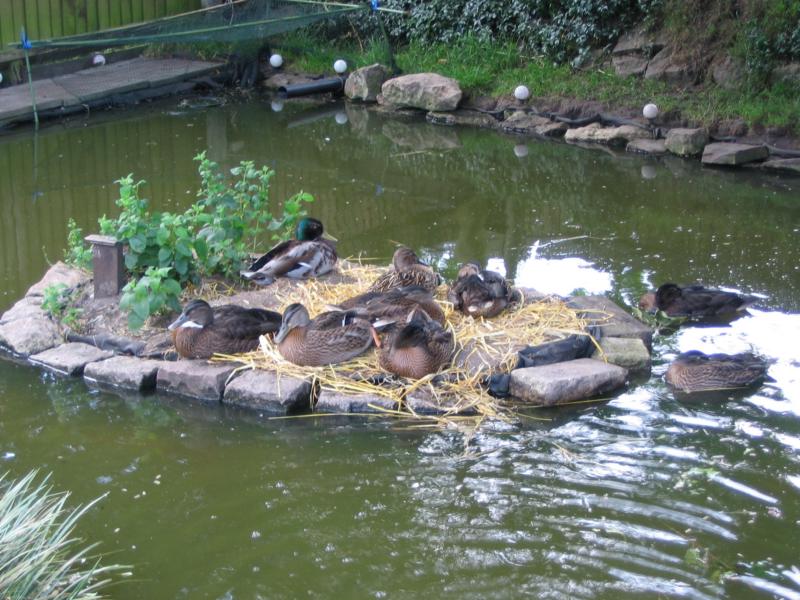
31st May, all 10 ducks on the island, with some new larger stones to stop the
butyl liner being folded into the water (as they get on and off
the island)
which allows water to seep onto the island which becomes mud.
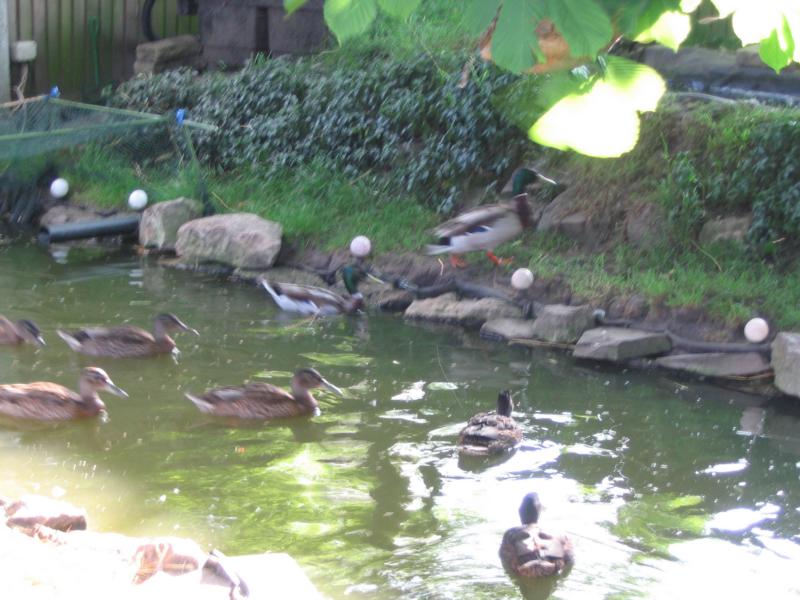
All the young ducks chasing an unwanted male from the pond. This is becoming quite common, even if mum and dad are not here.
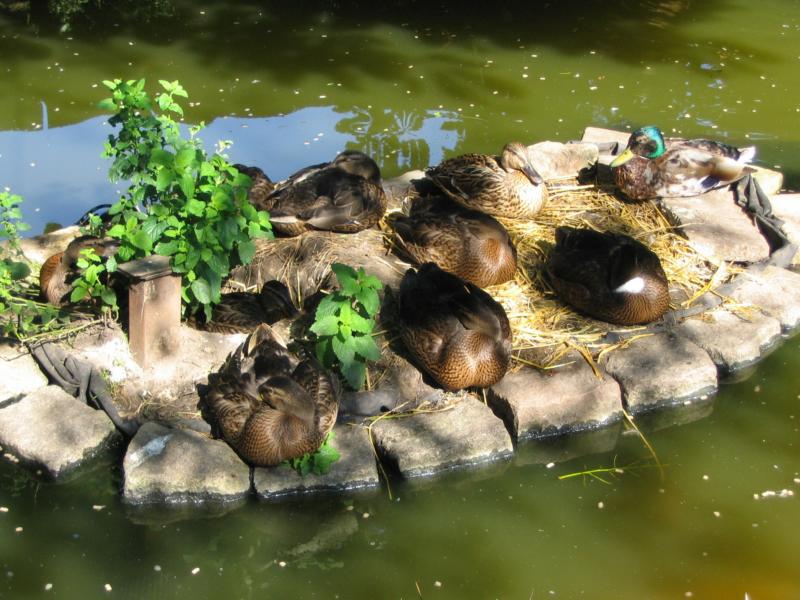
2nd June, eight young ducks asleep with mum and dad.
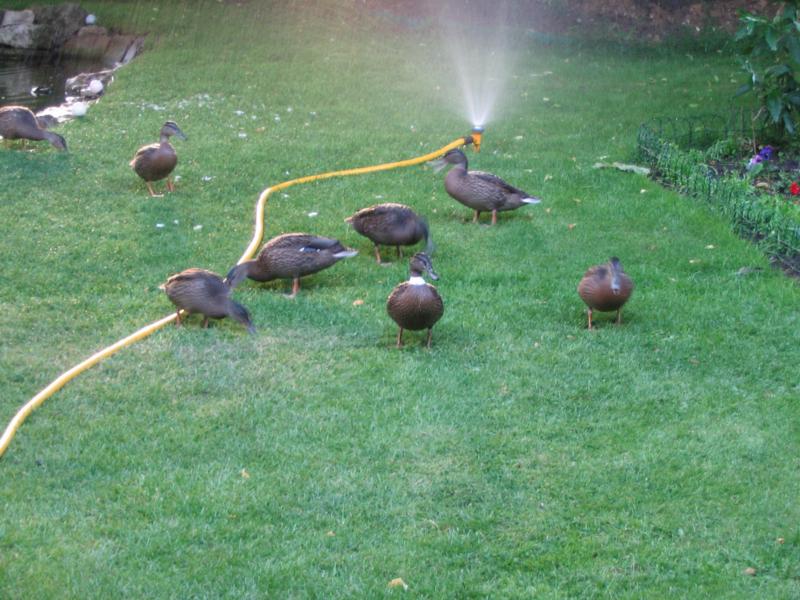
A damp lawn means they all go pecking for food.
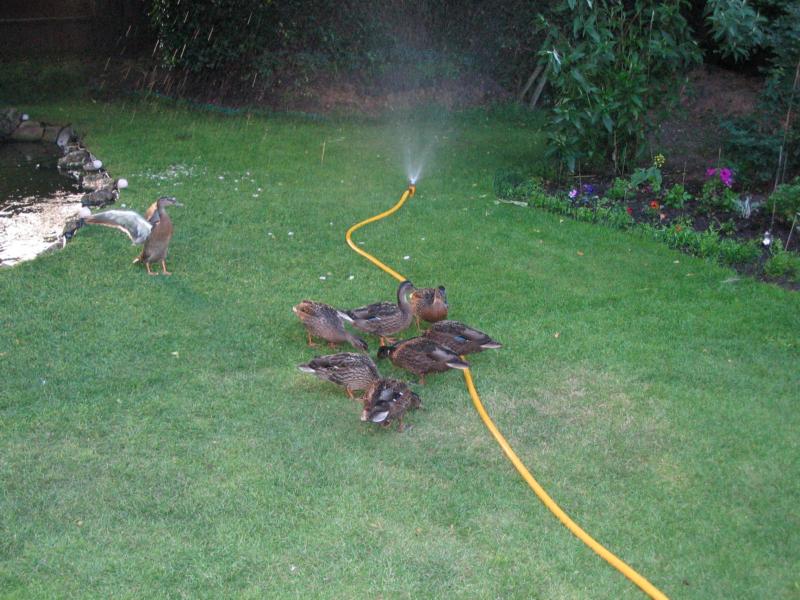
But still time for wing flapping. Lots of running around the lawn flapping wings, and short jumps into the water.
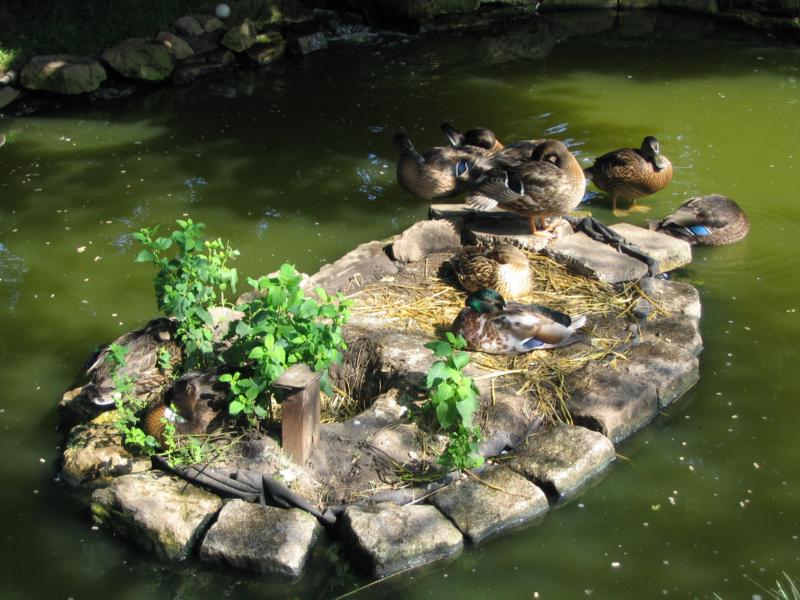
3rd June, some days dad gets aggressive and does not want the young ducks on the
island, so they sleep on the water or away from him.
Mum and dad are leaving
the pond for increasingly long periods, and the previous night was the last they
spent in the pond.
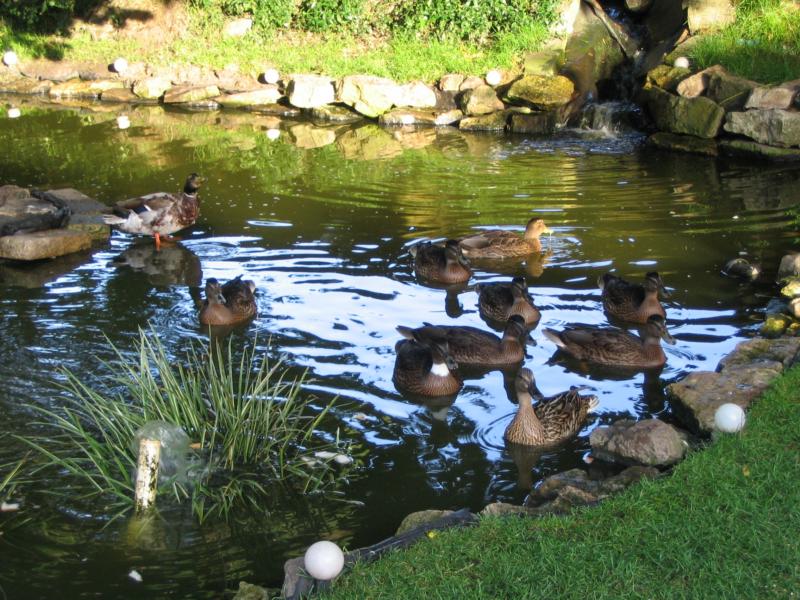
4th June, the previous evening, the young duck with the white neck ring started
flying from the island onto the lawn, and then flew away
with mum and dad
about 6pm, returning to the pond about 15 minutes later. I assume she
could not keep up with the adults, so returned,
although this never happened
last year. Mum and dad came back about 6am for three hours, then left for the
whole day returning briefly for
food about 9pm, but the young duck stayed
another night.
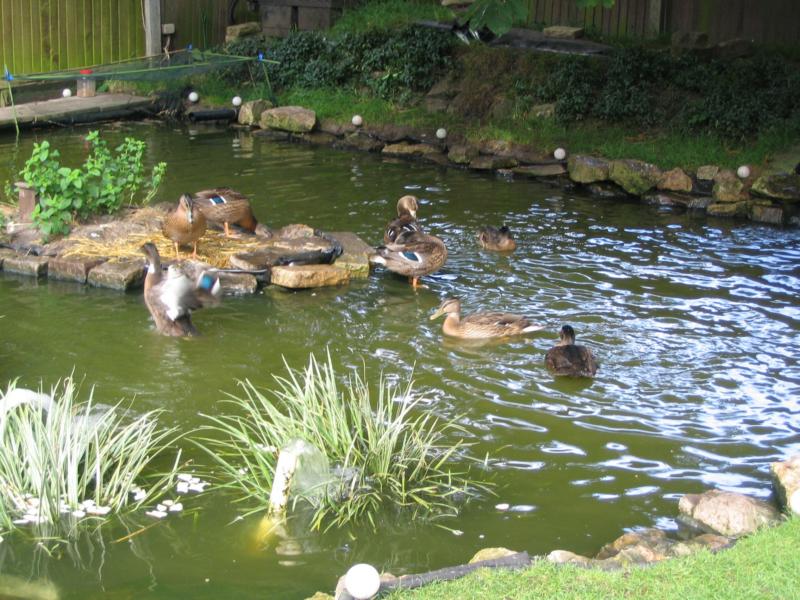
More splashing around in the pond, while mum and dad are away.
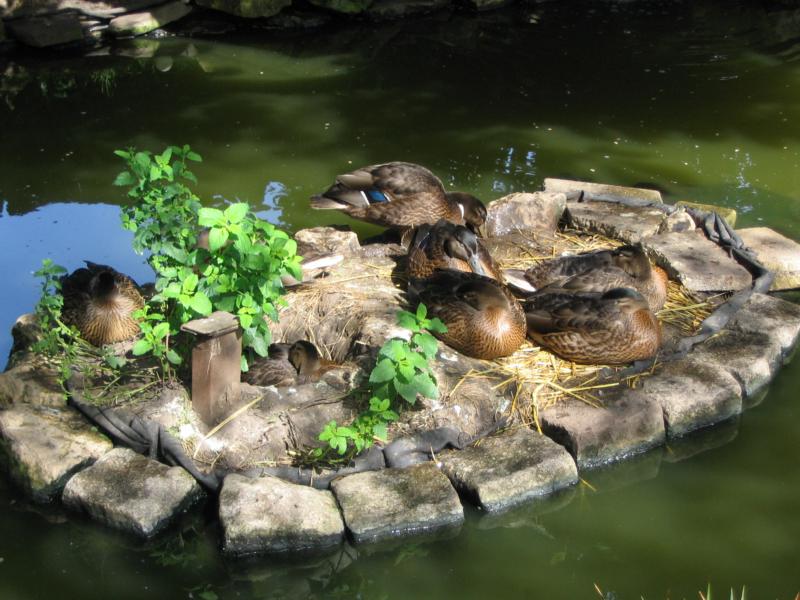
All eight young ducks on the island.
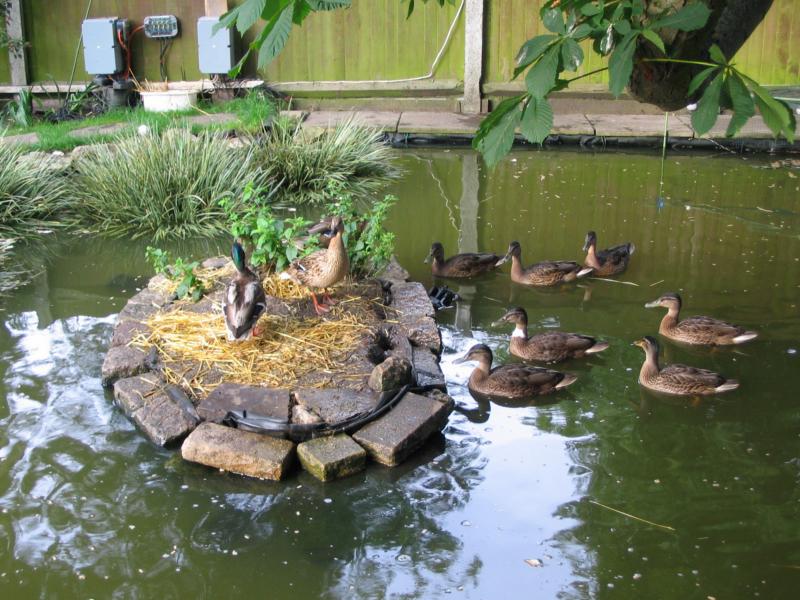
Still eight young ducks, not sure of their interest in the island.
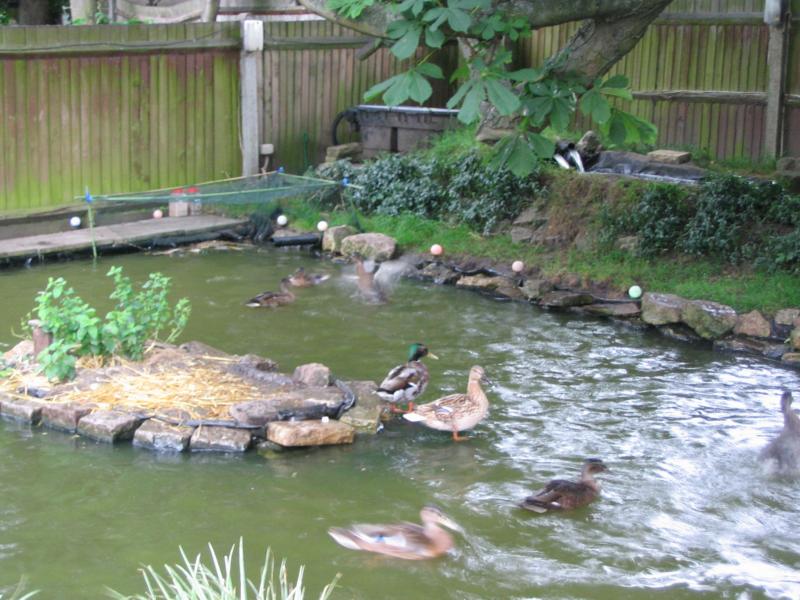
Racing around the island, splashing and flying short distance over the water.
There are now seven young ducks, the white necked one
flew away with mum and
dad about 9am, but did not return with them.
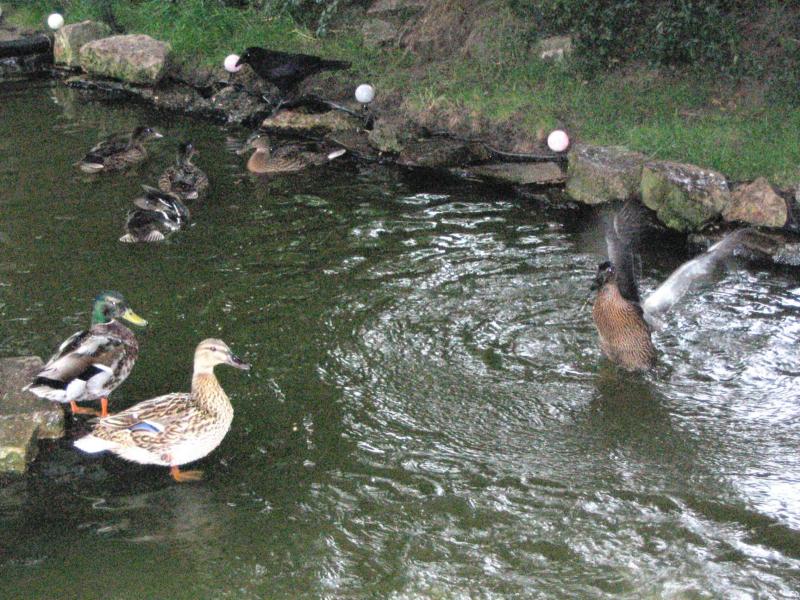
More wing exercises.
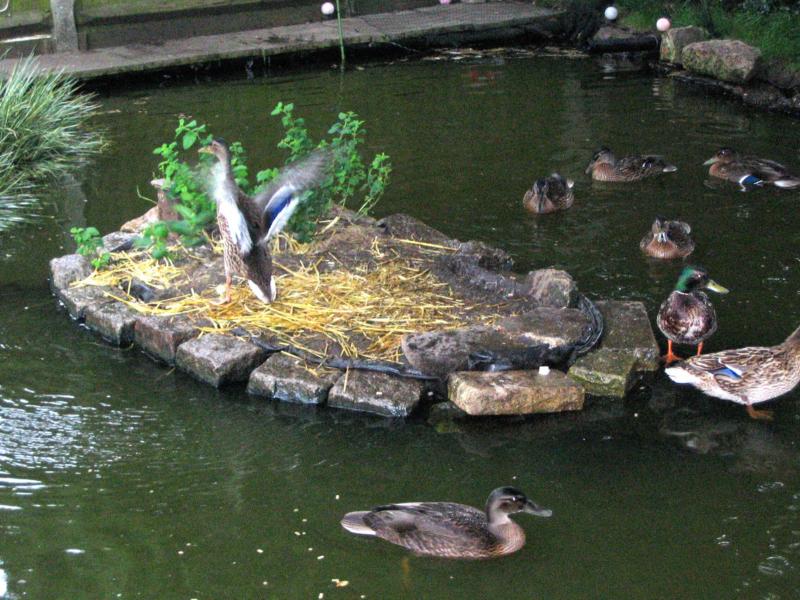
6th June, they are eight weeks old today. They are now starting to fly from the
island onto the lawn, mum and dad are still coming back
looking for food two
or three times a day, last year they had left before eight weeks.
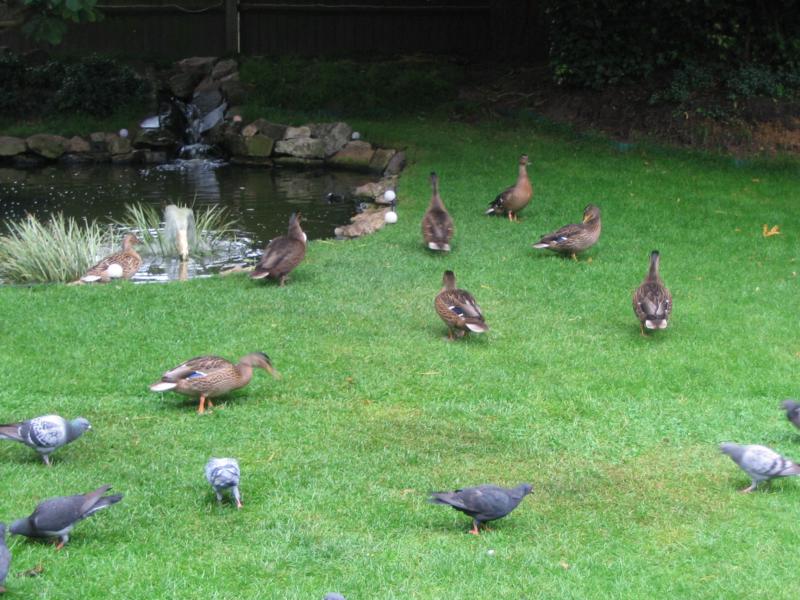
6th June, morning, seven young ducks on the lawn, mum in the shallow pond edge. Lots more running around and short flying.
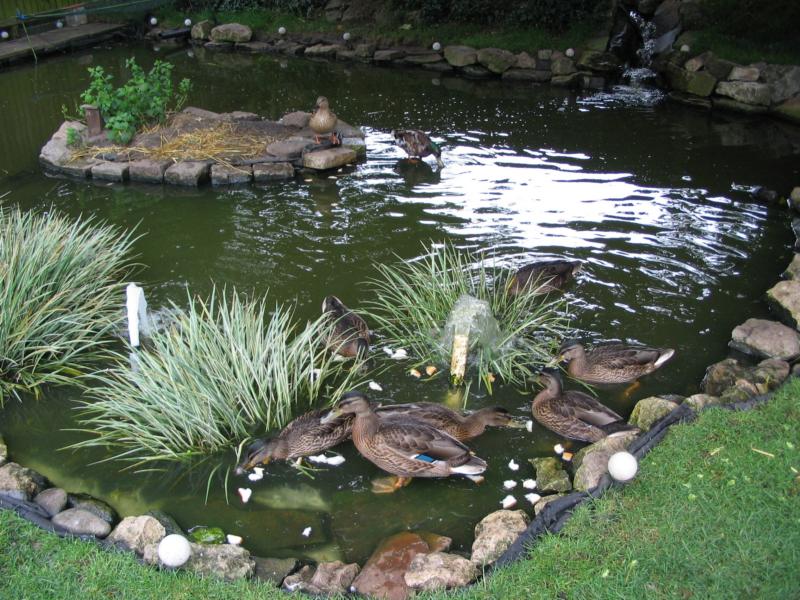
Followed by bread and lettuce.
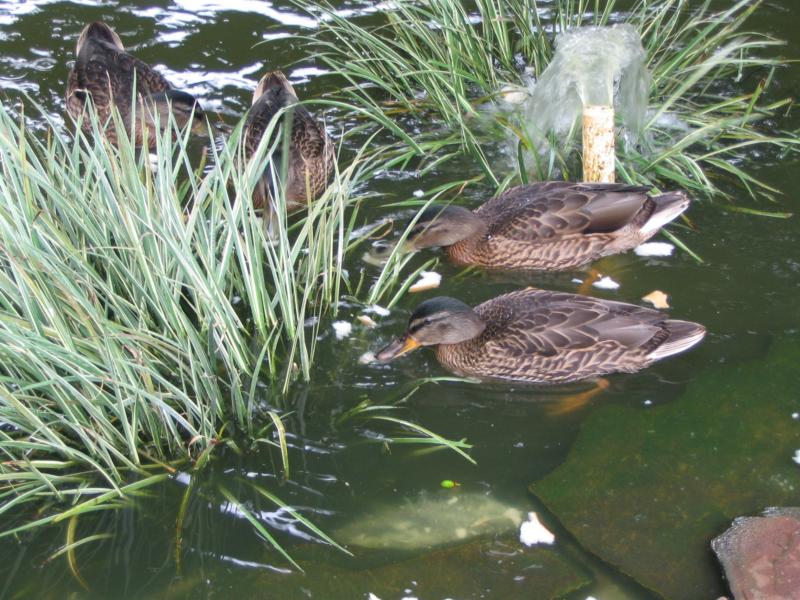
Still feeding.
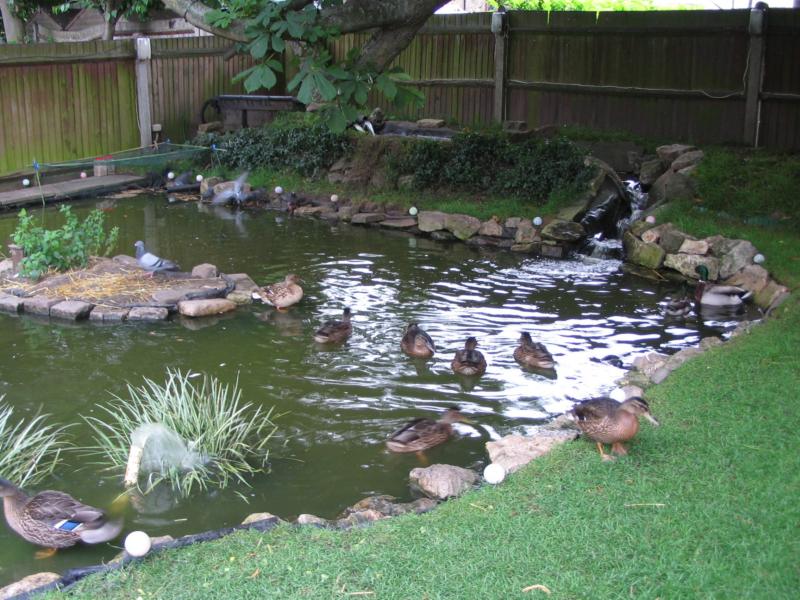
Two adult males in the corner of the pond, with mum and the remaining seven
young ducks in the evening. While I was watering the plants,
three young
ducks flew off the island and landed two feet away from me. Later five
ducks flew off the island together. When mum and
dad finally left for
the night, one young duck did try to follow, but forget to flap her wings and
landed three feet away on her front.
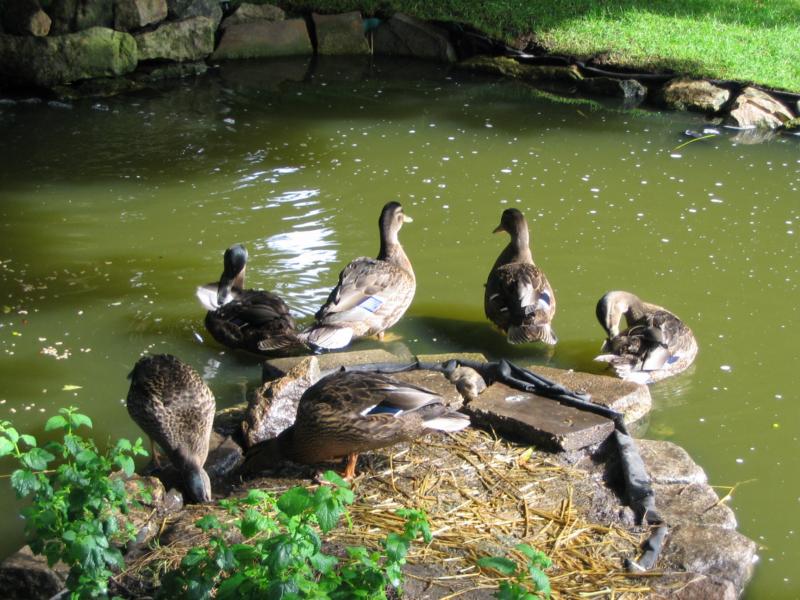
7th June, another young duck flew away early in the morning, during a
thunderstorm. The heavy rain has left muddy puddles on the island
which, for some reason, fascinate the six remaining young ducks.
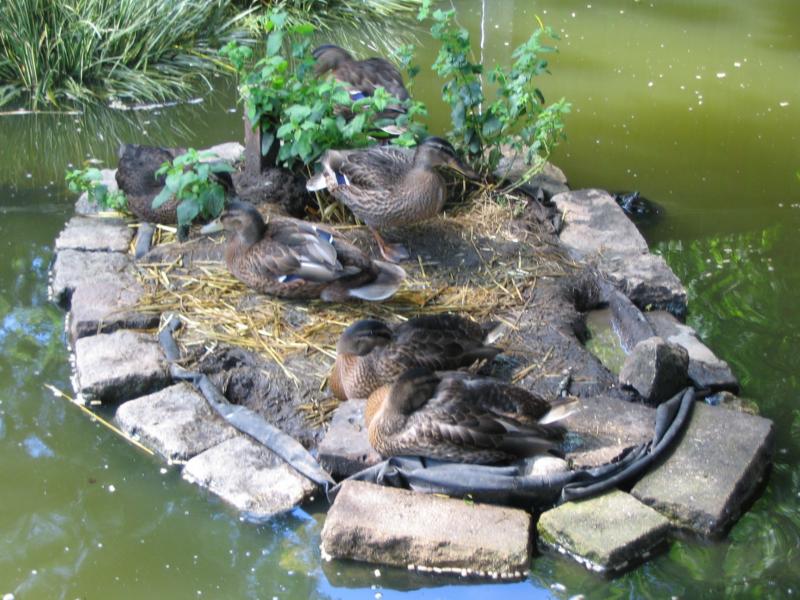
The six remaining young ducks, more room on the island now.
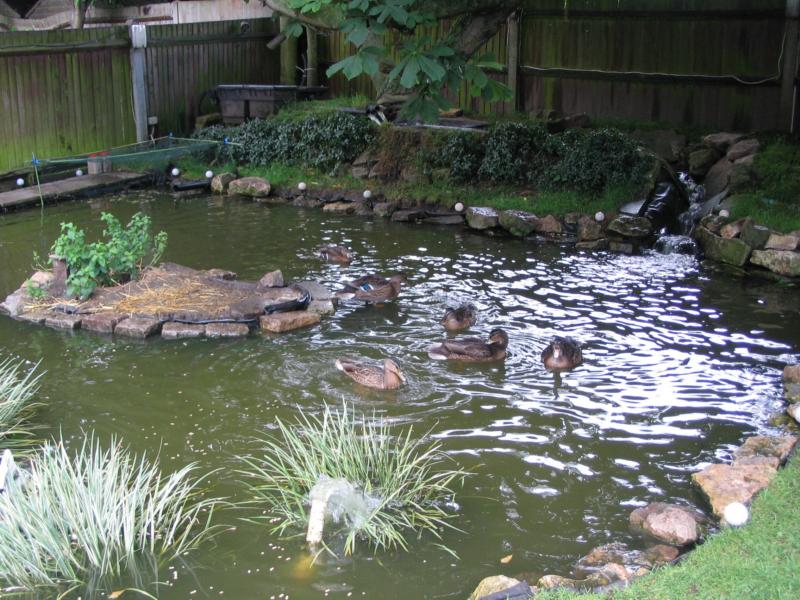
Morning exercise starting.
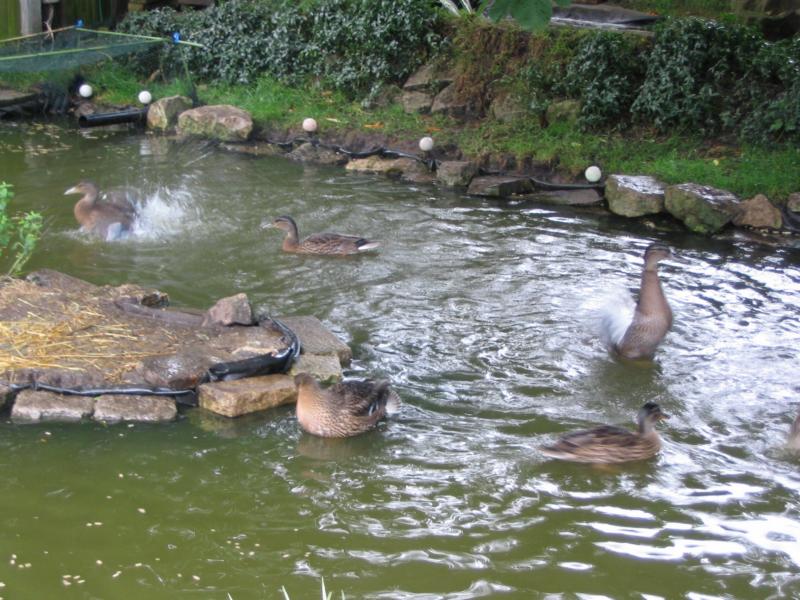
Lots more splashing and wing flapping. Mum and dad are still coming back
for food, but I expect all six young ducks to leave over the
next few days.
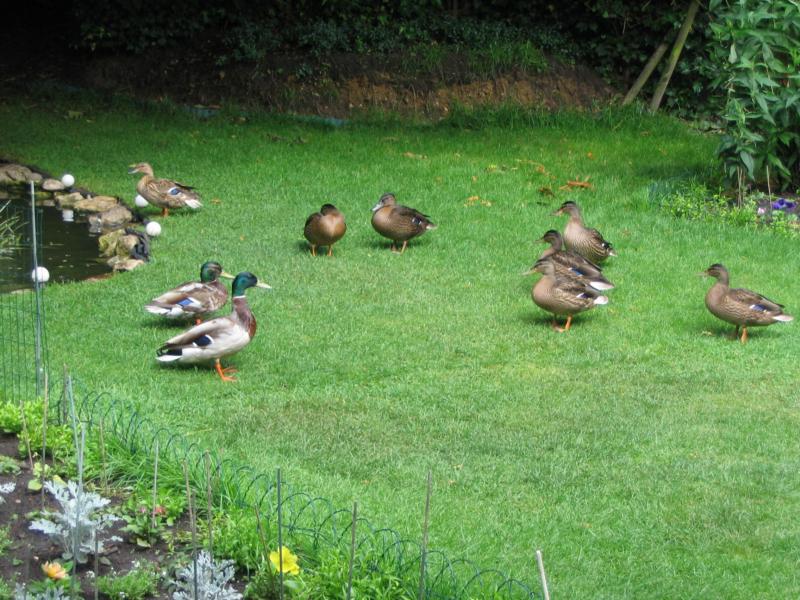
8th June, still six young ducks, mum and her two mates are still here and chasing each other around the lawn.
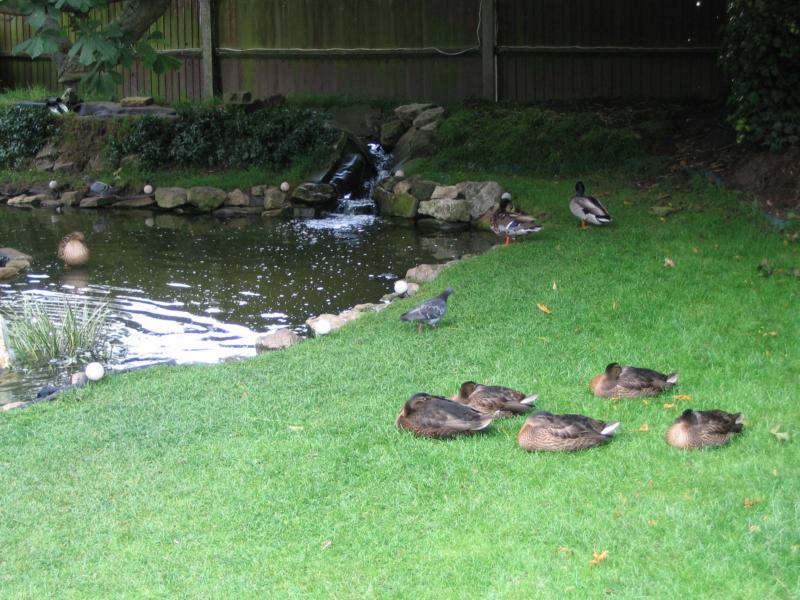
Until the young ducks get bored and go to sleep. All the young ducks can fly
now, and regularly fly from the island onto the lawn, and
vice versa, mostly
on their own, but also when chased by one of the cats.
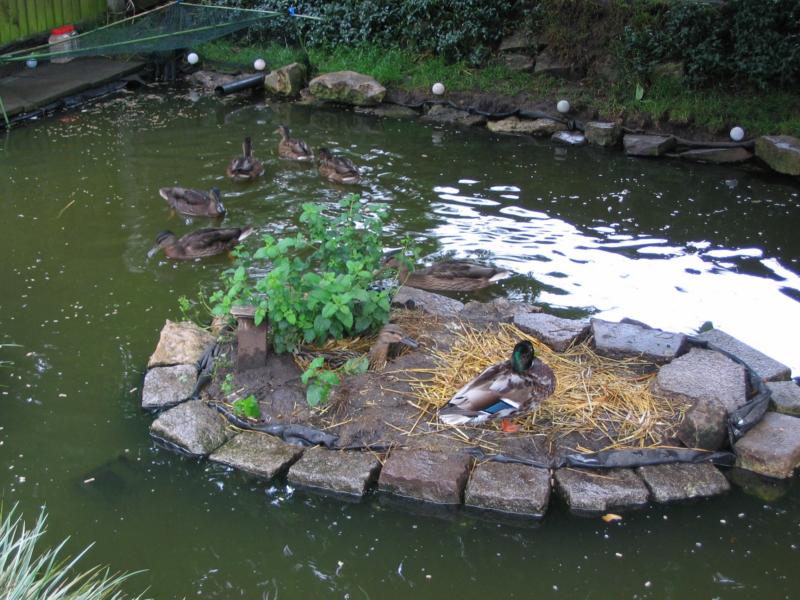
9th June, a very worrying sign when mum sits in the nest hole for the first time
in two months, and starts dragging straw from the island
back into the hole
to make a new nest. This was unexpected, but maybe explains why she had
not left the pond already, and why her
two mates have been coming back
regularly for the last two months.
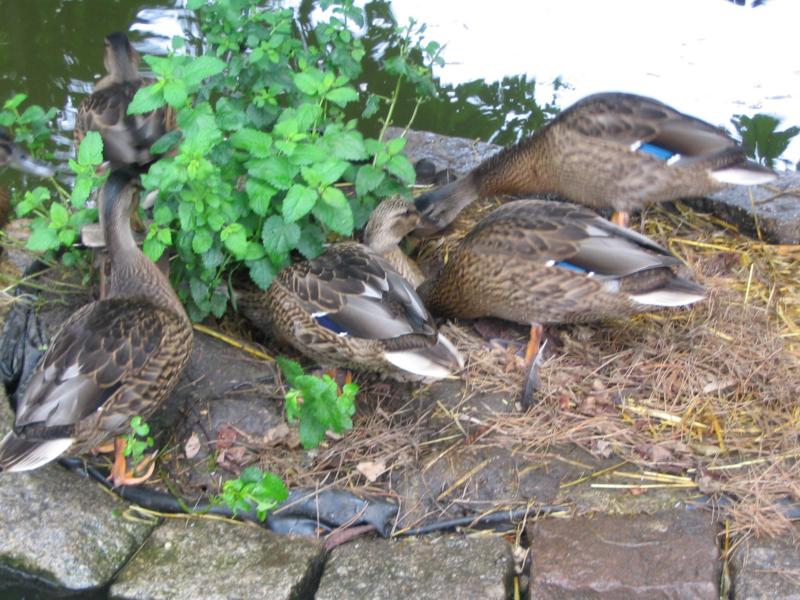
I
put some dried leaves onto the island as nesting material, which always excites
the young ducks, and they are pestering mum to see
what's in the nest.
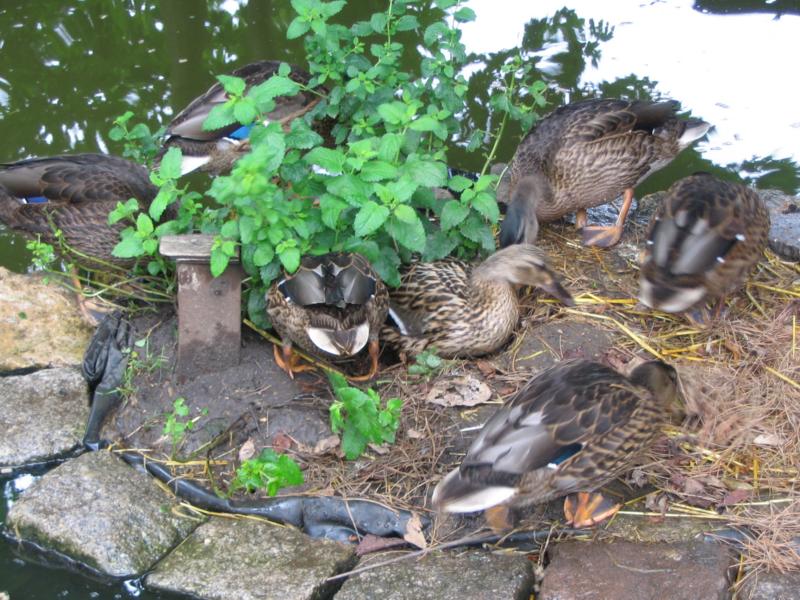
Until she finally concedes defeat and leaves them to it. She keeps flying away
and coming back all day. One young duck flies off with mum,
but comes back to
the pond an hour later, and leaves late in the evening.
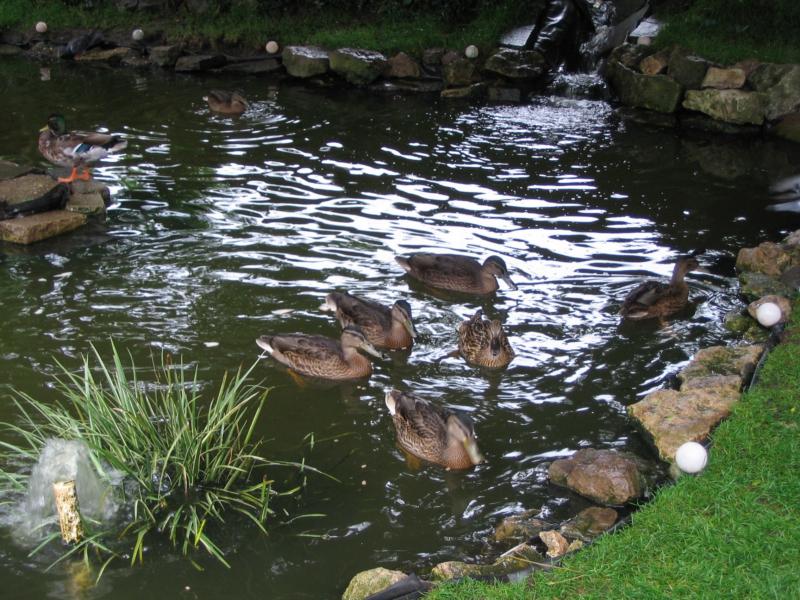
10th June, five young ducks are left, the one that left last night came back in the morning, but then left again and with another young duck.
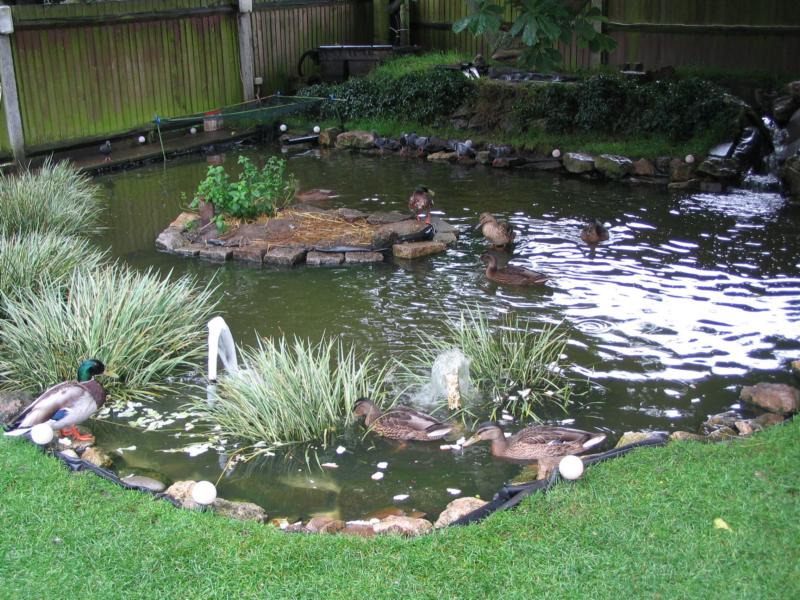
The evening is very busy, with five young ducks going and returning. Two
fly south, but one only gets as far as the next garden and comes
back to the
pond five minutes later.
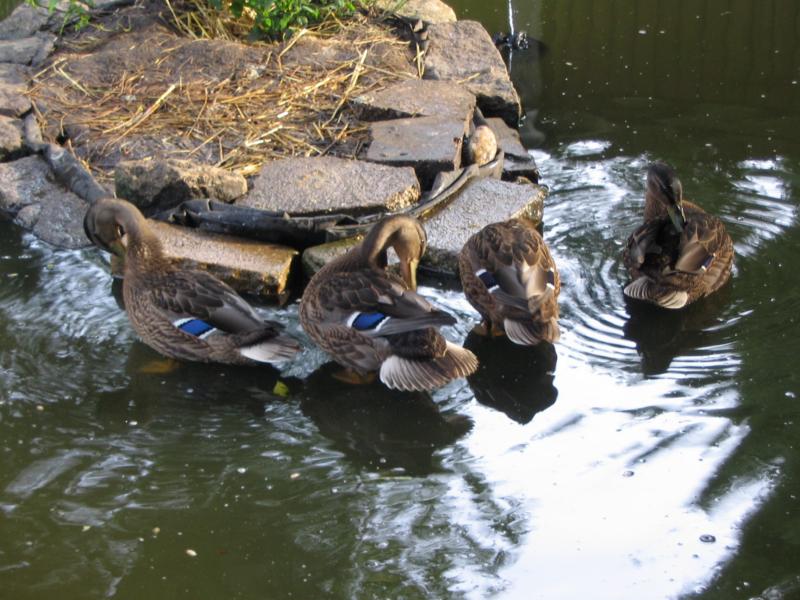
Then all four remaining young ducks fly off north together leaving the pond empty. Two return separately about 15 and 30 minutes later.
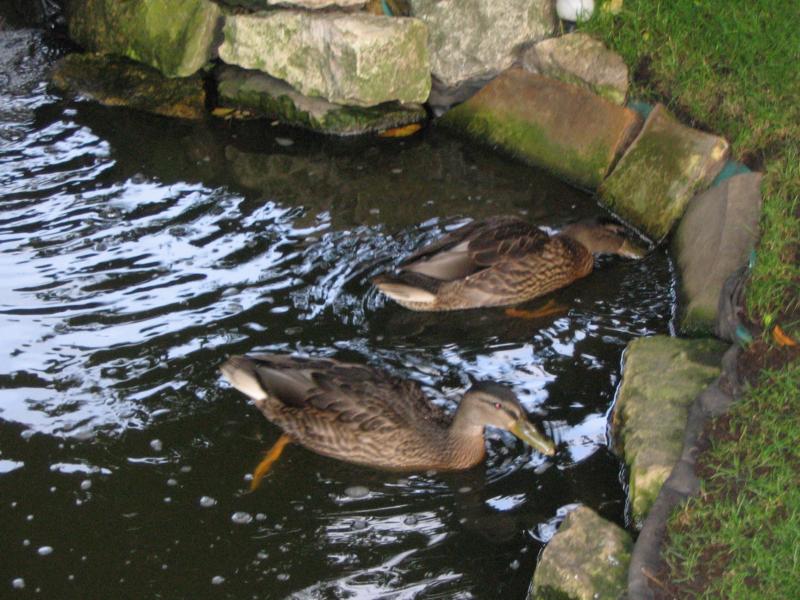
11th June, two remaining young ducks, mum and dad are here all day, but it's very quiet.
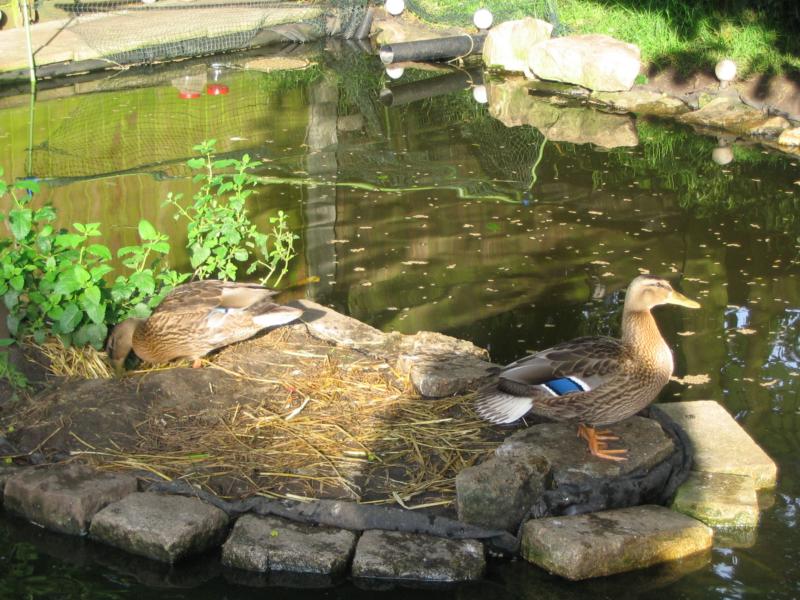
The young ducks are still interested in the new nest, and sleep in it.
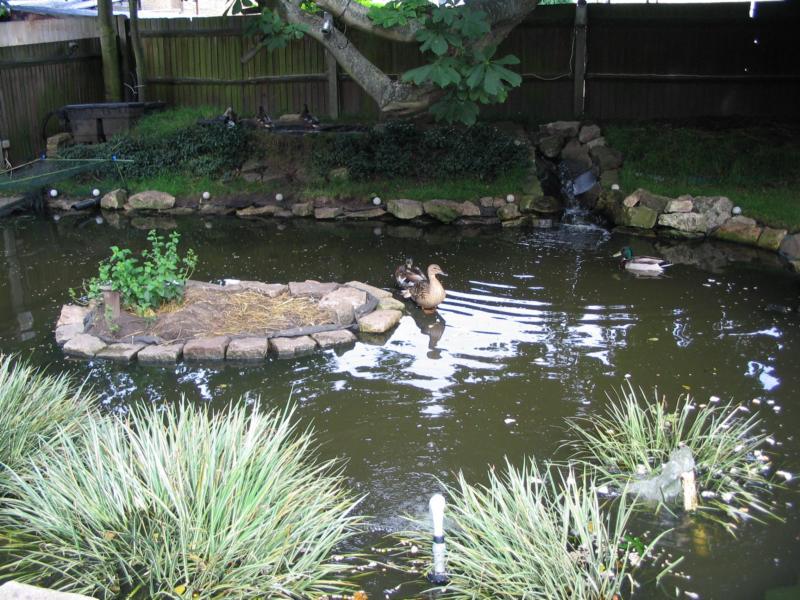
12th June. Two young ducks still here, but dad's behaviour changes today,
and he spends much of the time chasing the young ducks
around the pond, out
of the water and, around the garden. It gives the young ducks a lot of
flying exercise, this photo has them on the
bank beside the top pond,
keeping out of the way. It's almost as if dad knows mum is ready to start laying
again, and will not do so until
the young ducks leave.
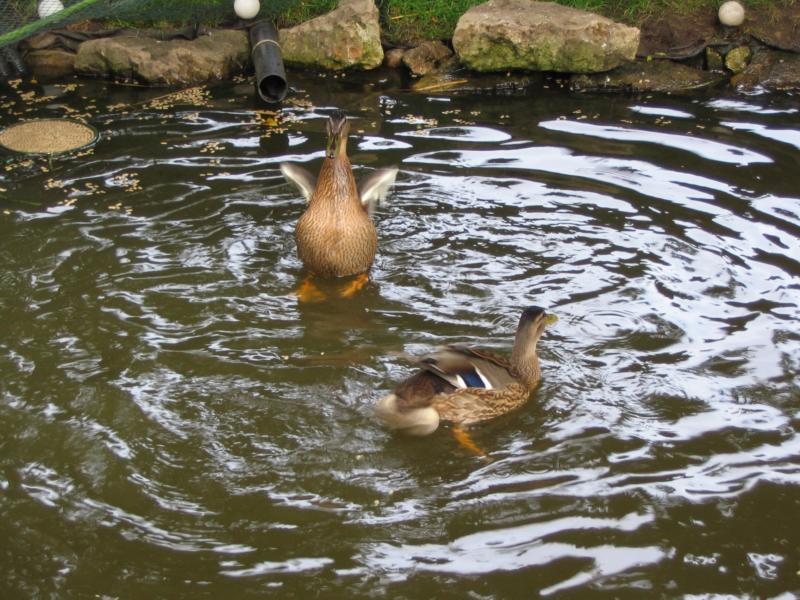
Although they still get back into the main pond, until chased off again.
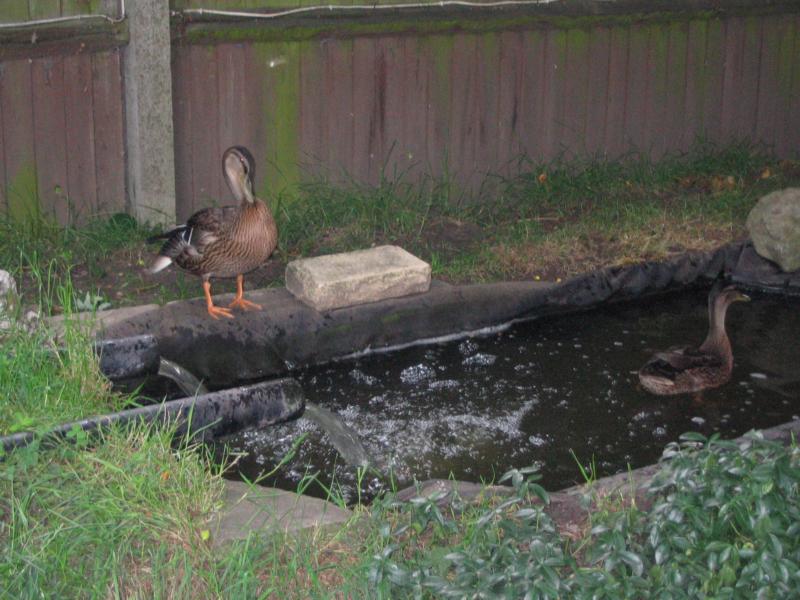
Back up at the top pond.
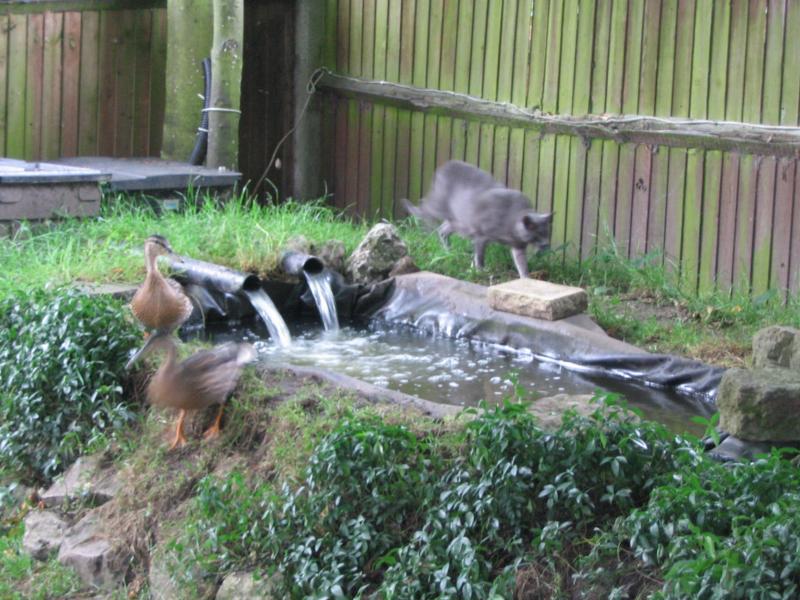
Until a neighbour's cat comes along. The last two young ducks finally
leave the pond on the evening of 12th June, while mum and dad are
still here,
but they also leave a little later so there's an empty pond overnight for the
first time in three months.
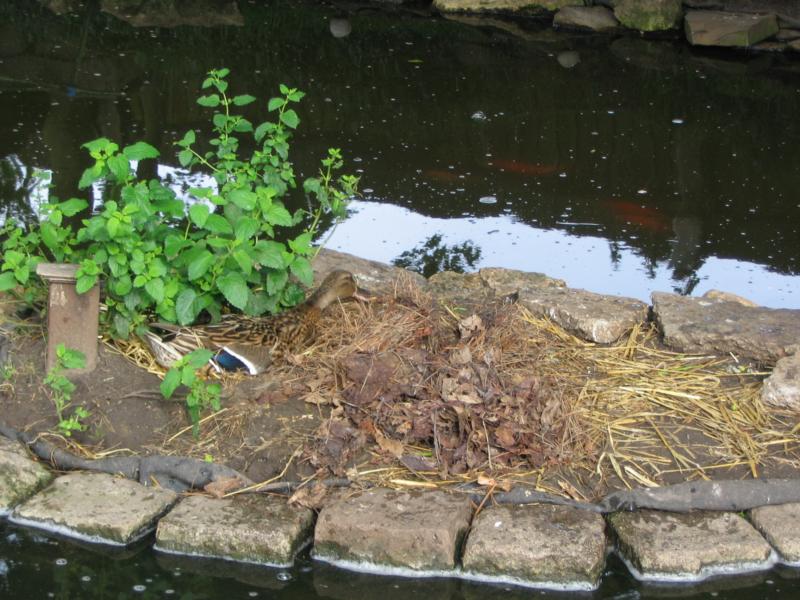
But it does not last, 13th June and mum and dad are back, with some serious nest
building going on, now there are no young ducks to
destroy it.
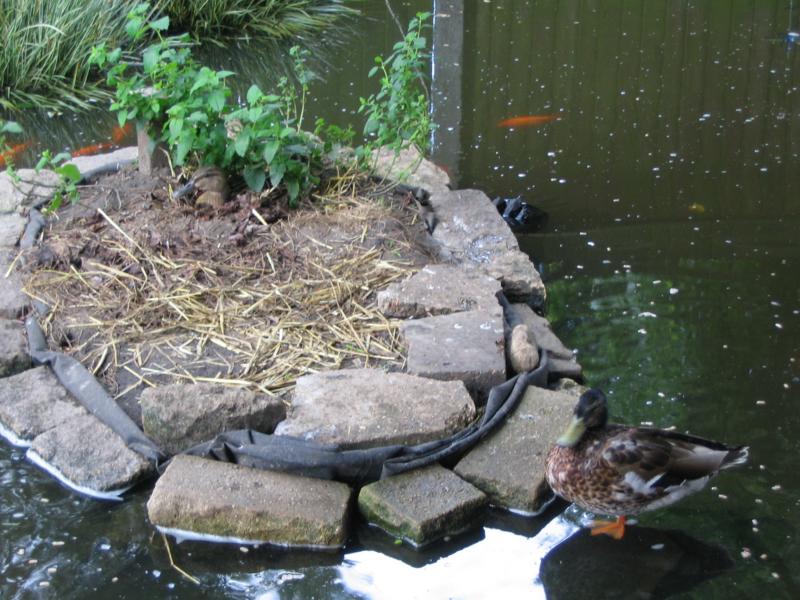
Laying the first egg in the new nest. Mum and dad stay all day and night, it's
unusual for dad to stay overnight, but mum is only in the nest
for an hour or
so.
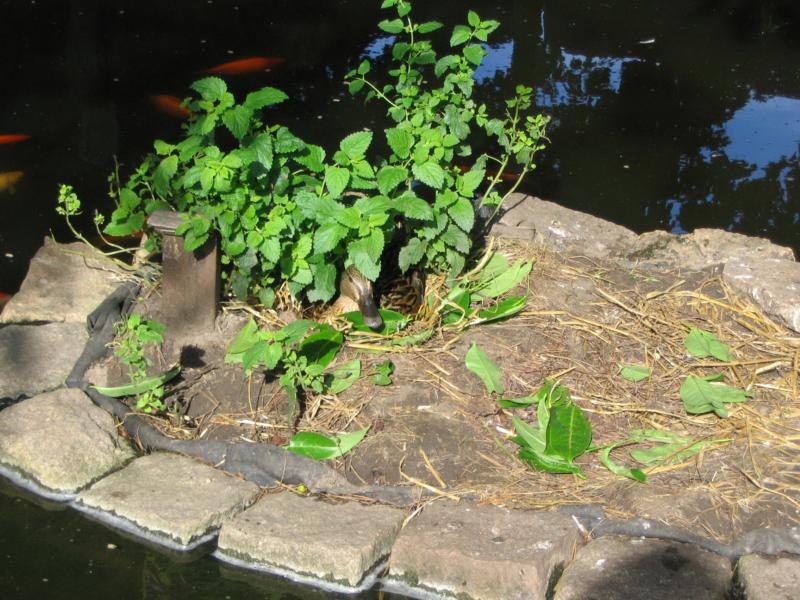
14th June, mum is back in the nest, almost covered by the mint plants. with some hedge cuttings.
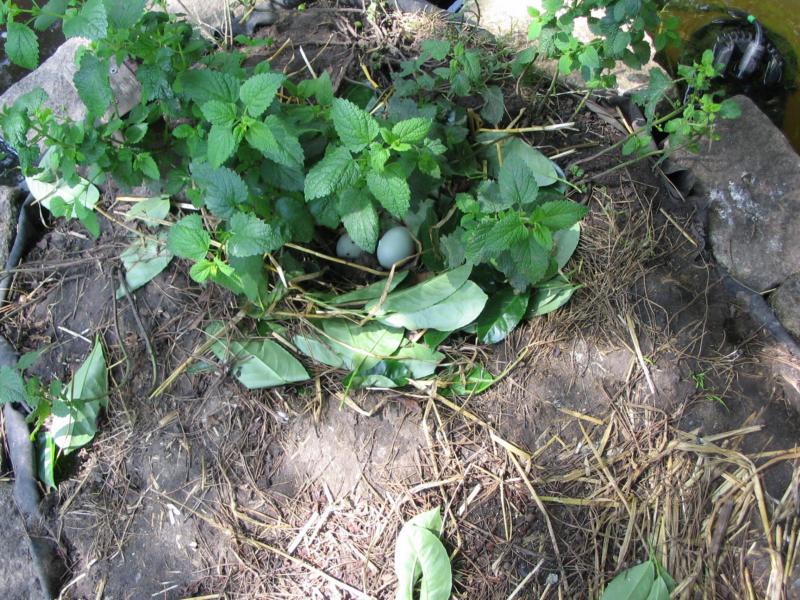
Two eggs in the new nest, she started laying the morning after the last young ducks left.
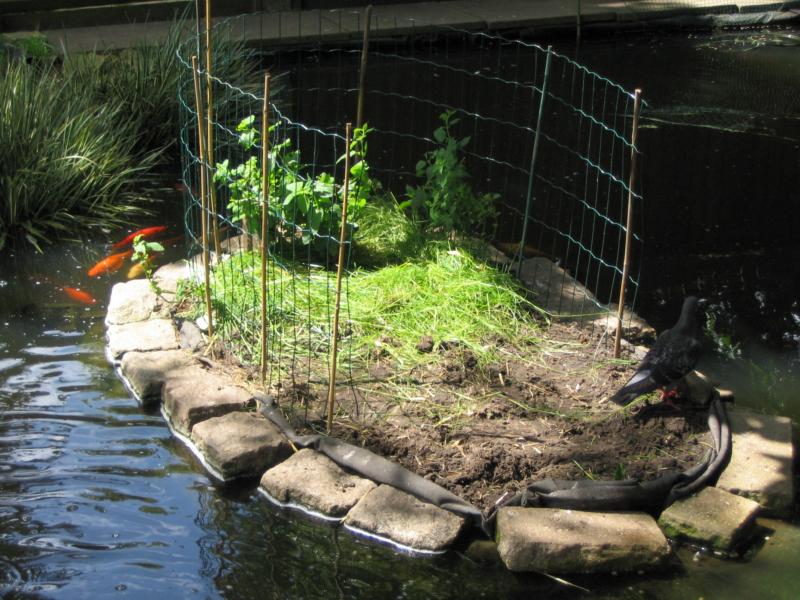
I
was expecting to clean the island and lay some grass seed, but instead I've put
the fence back on the island to stop the fox jumping onto
it and got some
soft long grass from a neighbour's garden, to help with the new nest.
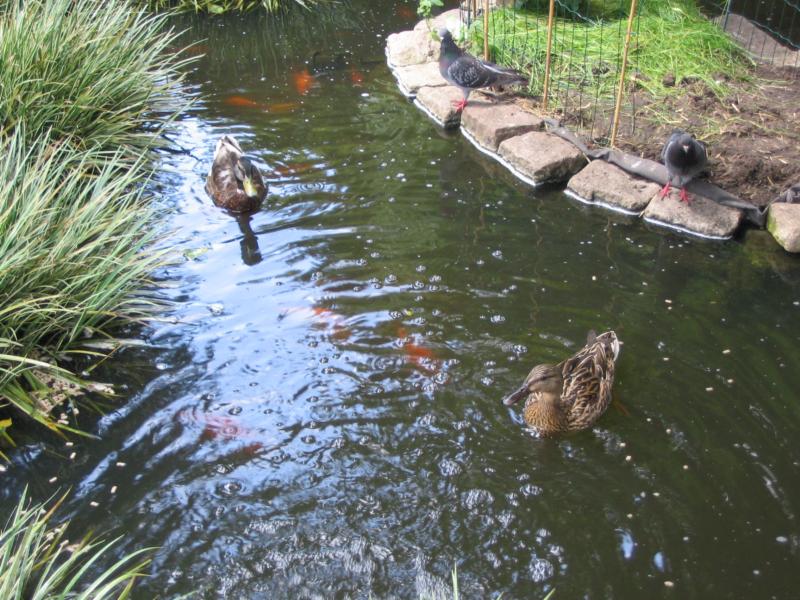
Mum and dad watched me rebuild the island, but have not been back on it yet,
despite being here most of the day, with the second male
arriving as well.
Hopefully she will lay a third egg in the morning. In theory, she should
be laying for another week or so, one egg a day,
then incubating for 24
days, meaning the new ducklings should hatch about 16th July, and remain until
mid September. Fortunately the
pond filter system is working well at
the moment and the water is clear so you can see fish in this photo, but the
pond plants won't
recover if the ducks are eating them all summer.
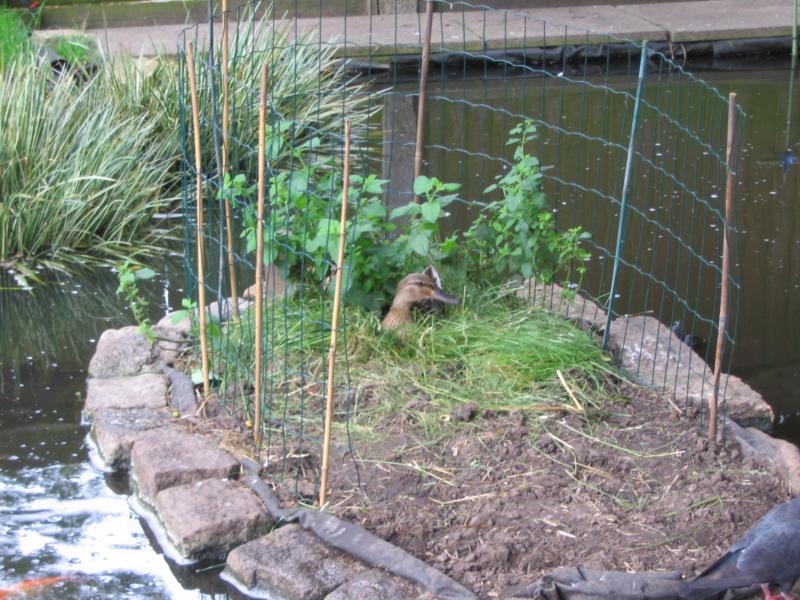
15th June, mum is still laying one egg per day, well hidden under the cut grass.
She is spending about two hours a day on the nest laying
an egg, then mostly
stating at the pond for the rest of the day, and sometimes the night.
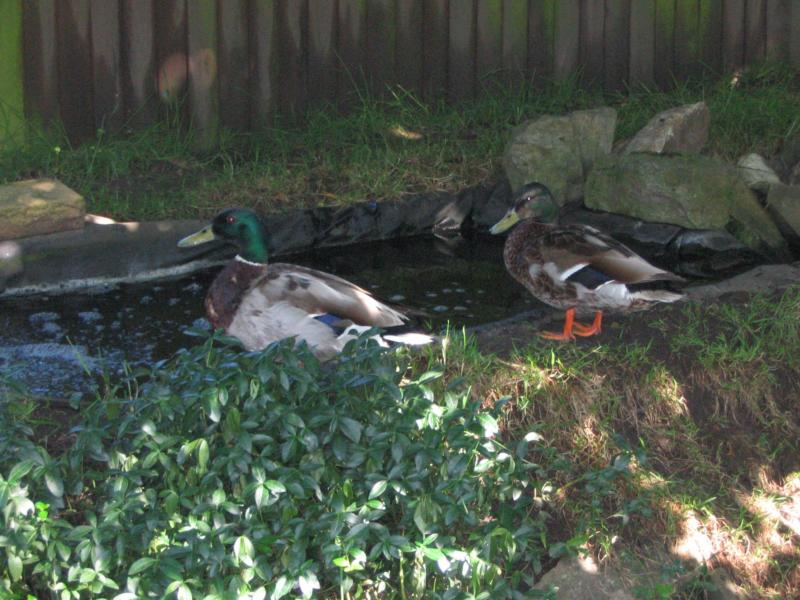
Her two mates are still here as well, although her main mate (with less grey feathers) keeps trying to force the second one away from mum.
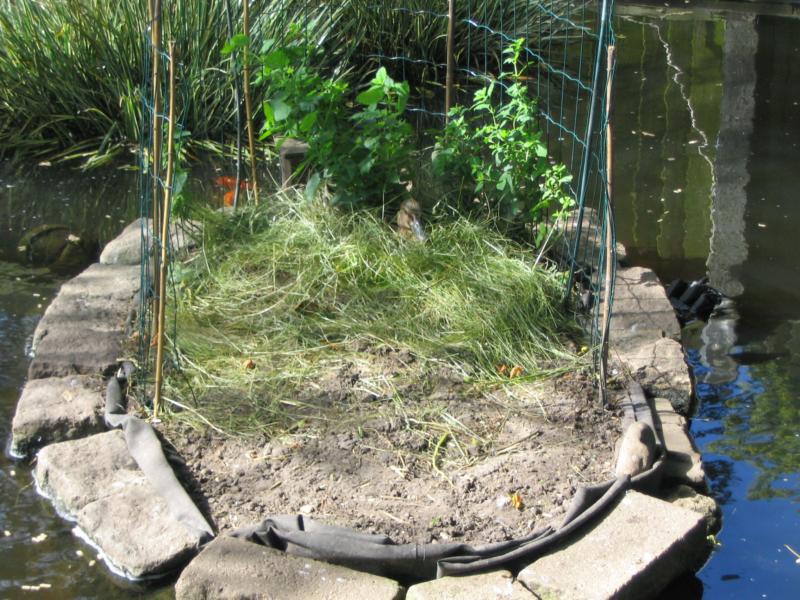
19th June, mum is sits on the nest all day, until about 8pm in the evening, when she leaves the pond with her mate.
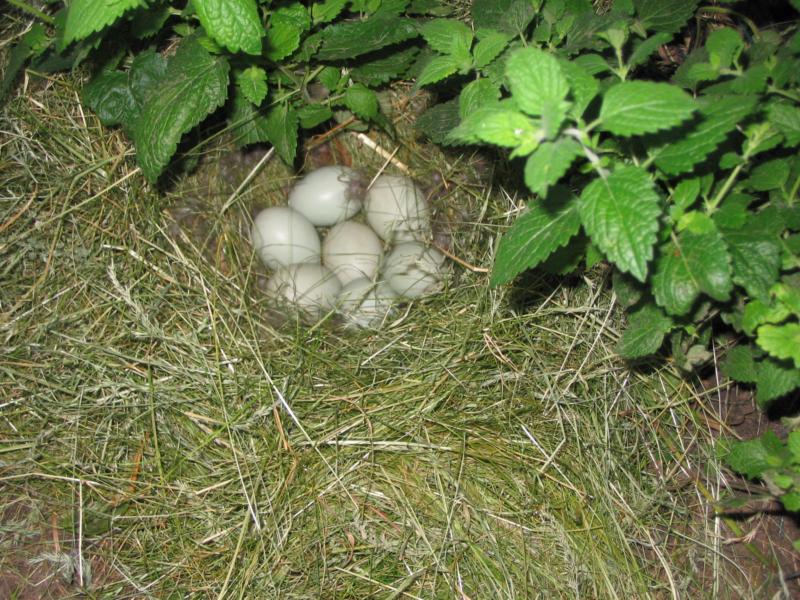
Which gives me a change to get onto the island, and there are now seven eggs.
Mum and dad come back late at night, for the night. But they are both gone
early the following morning, and have not returned to the pond
for two days,
unless it was at dawn. One of the boys was on the house roof waiting for her
to come back, but left after three hours.
There are still seven eggs
safely in the nest, although they had been re-arranged since this photo was
taken so she had been back on the
nest at some point. I did find a bird
wing at the end of the garden, with some blue feathers, but it seemed too
small for a mallard, might
have been a jay, the fledglings of the crows, jays
and magpies are very vulnerable at the moment. If the fox had caught
her, I'd have
expected a lot of feathers near the pond, and there were none.
But the ducks are very aware of the foxes and are safe on the water.
29th June, no more ducks in the pond, two boys were on the house roof, but have
not been back for a week. The crows did not find the
nest, so I
finally removed the eggs myself. Hopefully, the boys will find new mates in the
autumn and bring a new mum back to the pond
next spring.
All photos and text on this web site is © Copyright 2026-2022
www.croydonducks.co.uk and may not be reproduced, copied or linked
without prior written permission. All rights reserved.